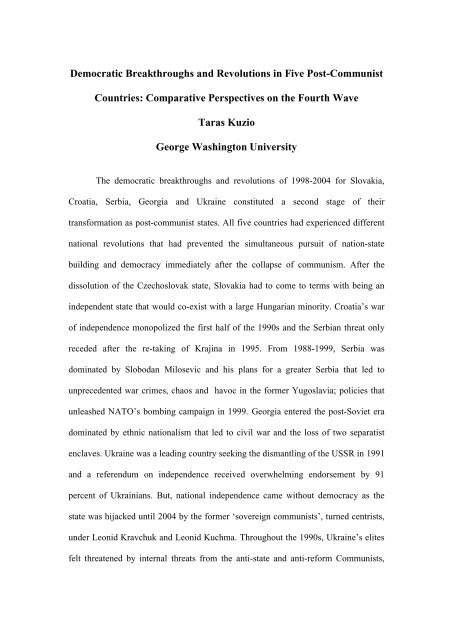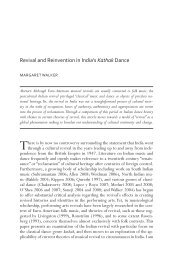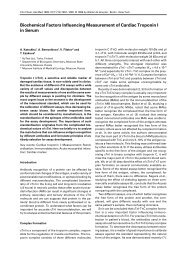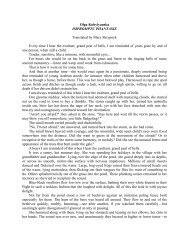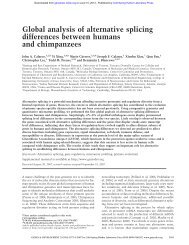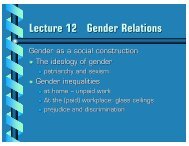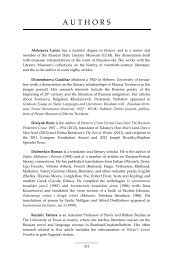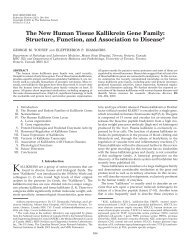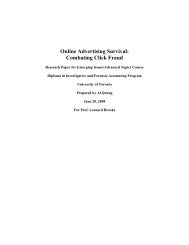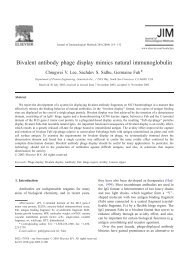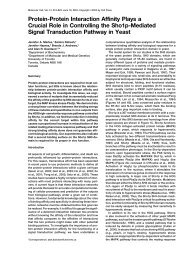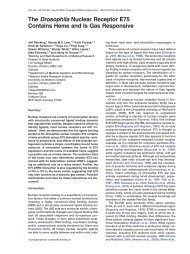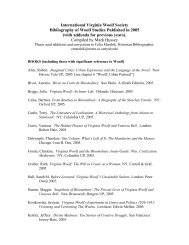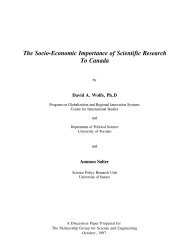Democratic Breakthroughs and Revolutions in Five Post-Communist ...
Democratic Breakthroughs and Revolutions in Five Post-Communist ...
Democratic Breakthroughs and Revolutions in Five Post-Communist ...
You also want an ePaper? Increase the reach of your titles
YUMPU automatically turns print PDFs into web optimized ePapers that Google loves.
<strong>Democratic</strong> <strong>Breakthroughs</strong> <strong>and</strong> <strong>Revolutions</strong> <strong>in</strong> <strong>Five</strong> <strong>Post</strong>-<strong>Communist</strong>Countries: Comparative Perspectives on the Fourth WaveTaras KuzioGeorge Wash<strong>in</strong>gton UniversityThe democratic breakthroughs <strong>and</strong> revolutions of 1998-2004 for Slovakia,Croatia, Serbia, Georgia <strong>and</strong> Ukra<strong>in</strong>e constituted a second stage of theirtransformation as post-communist states. All five countries had experienced differentnational revolutions that had prevented the simultaneous pursuit of nation-statebuild<strong>in</strong>g <strong>and</strong> democracy immediately after the collapse of communism. After thedissolution of the Czechoslovak state, Slovakia had to come to terms with be<strong>in</strong>g an<strong>in</strong>dependent state that would co-exist with a large Hungarian m<strong>in</strong>ority. Croatia’s warof <strong>in</strong>dependence monopolized the first half of the 1990s <strong>and</strong> the Serbian threat onlyreceded after the re-tak<strong>in</strong>g of Kraj<strong>in</strong>a <strong>in</strong> 1995. From 1988-1999, Serbia wasdom<strong>in</strong>ated by Slobodan Milosevic <strong>and</strong> his plans for a greater Serbia that led tounprecedented war crimes, chaos <strong>and</strong> havoc <strong>in</strong> the former Yugoslavia; policies thatunleashed NATO’s bomb<strong>in</strong>g campaign <strong>in</strong> 1999. Georgia entered the post-Soviet eradom<strong>in</strong>ated by ethnic nationalism that led to civil war <strong>and</strong> the loss of two separatistenclaves. Ukra<strong>in</strong>e was a lead<strong>in</strong>g country seek<strong>in</strong>g the dismantl<strong>in</strong>g of the USSR <strong>in</strong> 1991<strong>and</strong> a referendum on <strong>in</strong>dependence received overwhelm<strong>in</strong>g endorsement by 91percent of Ukra<strong>in</strong>ians. But, national <strong>in</strong>dependence came without democracy as thestate was hijacked until 2004 by the former ‘sovereign communists’, turned centrists,under Leonid Kravchuk <strong>and</strong> Leonid Kuchma. Throughout the 1990s, Ukra<strong>in</strong>e’s elitesfelt threatened by <strong>in</strong>ternal threats from the anti-state <strong>and</strong> anti-reform <strong>Communist</strong>s,
2who were the largest political force until the 2002 elections, <strong>and</strong> externally fromRussia, which refused to recognize Ukra<strong>in</strong>e’s borders until 1997-1999.The Slovak 98’Ok Campaign was perceived by the democratic opposition asSlovakia’s opportunity to complete the Velvet Revolution that had escaped thecountry <strong>in</strong> 1989-1990 <strong>and</strong> remove Vladimir Meciar’s populist nationalism that haduntil then dom<strong>in</strong>ated post-communist Slovakia. The Croatian opposition also soughtto put great distance with the nationalist 1990s <strong>in</strong> favor of ‘return<strong>in</strong>g to Europe’through domestic democratic reforms. Georgia’s opposition sought to overcome afailed <strong>and</strong> dismembered state, amid deep levels of stagnation under EduardShevardnadze. Georgian analyst Nodia believes that, ‘our revolution <strong>in</strong> 2003rem<strong>in</strong>ded us of the Eastern European revolution of 1989’ when a new generation ofnon-communist elites came to power. 1A similar sense of unf<strong>in</strong>ished revolutionpermeated Ukra<strong>in</strong>e’s Orange Revolution that, for its leaders <strong>and</strong> supporters,represented the democratic conclusion to the national revolution of 1991.This chapter is divided <strong>in</strong>to two sections. The first sector analyses ten causalfactors that contribute towards democratic breakthroughs <strong>and</strong> revolutions <strong>in</strong> Slovakia,Croatia, Serbia, Georgia <strong>and</strong> Ukra<strong>in</strong>e. These factors differ <strong>in</strong> their degree of <strong>in</strong>tensityfor all five states. The absence of all, or some, of these factors will prevent successfuldemocratic revolutions <strong>in</strong> Russia, Belarus, Azerbaijan <strong>and</strong> other CIS states. The tenfactors <strong>in</strong>clude the existence of a competitive authoritarian state facilitat<strong>in</strong>g space forthe democratic opposition, ‘return to Europe’ civic nationalism that assists <strong>in</strong> civilsociety’s mobilization, a preced<strong>in</strong>g political crisis, a pro-democratic capitol city,unpopular rul<strong>in</strong>g elites, a charismatic c<strong>and</strong>idate, a united opposition, mobilized youth,regionalism <strong>and</strong> foreign <strong>in</strong>tervention. The second section discusses developmentsfollow<strong>in</strong>g democratic breakthroughs <strong>and</strong> revolutions <strong>in</strong> the five states. The section is
3divided <strong>in</strong>to four themes, the new regimes ability to deal with the legacies of the past,divisions <strong>in</strong> the democratic opposition, return of the ancien regime <strong>and</strong> progress <strong>in</strong>democratization.<strong>Democratic</strong> <strong>Breakthroughs</strong> <strong>and</strong> <strong>Revolutions</strong>Ten factors have been important to the success of democratic breakthroughs<strong>and</strong> revolutions <strong>in</strong> post-communist states. These <strong>in</strong>clude a competitive (i.e. semi)authoritarian state facilitat<strong>in</strong>g space for the democratic opposition, ‘return to Europe’civic nationalism that assists <strong>in</strong> civil society’s mobilization, a preced<strong>in</strong>g politicalcrisis that weakened the regime’s legitimacy, a pro-democratic capitol city, unpopularrul<strong>in</strong>g elites, a charismatic c<strong>and</strong>idate, a united opposition, mobilized youth,regionalism <strong>and</strong> foreign <strong>in</strong>tervention (Russia or the EU). The latter two can be bothh<strong>in</strong>drances <strong>and</strong> supportive factors, depend<strong>in</strong>g on the country <strong>in</strong> question <strong>and</strong> theforeign actor. This discussion of ten factors builds on McFaul who listed seven factorsthat <strong>in</strong>clude a semi-authoritarian regime, an unpopular leader <strong>and</strong> regime, a unitedopposition, a perception of a falsified election, some degree of <strong>in</strong>dependent media,ability of the opposition to mobilize <strong>and</strong> divisions <strong>in</strong> the security forces. 2Competitive-Authoritarian RegimeThe replacement of authoritarian regimes <strong>in</strong> Slovakia (1998) <strong>and</strong> Croatia(1999-2000), <strong>and</strong> democratic revolutions <strong>in</strong> Serbia (2000), Georgia (2003), <strong>and</strong>Ukra<strong>in</strong>e (2004) occurred <strong>in</strong> five countries that can be classified as ‘competitiveauthoritarian’ <strong>in</strong> which hybrid regimes comb<strong>in</strong>ed elements of both authoritarianism<strong>and</strong> democracy. 3 Slovakia <strong>and</strong> Croatia exhibited some similarities to Serbia, Georgia<strong>and</strong> Ukra<strong>in</strong>e <strong>in</strong> which civil society mobilised to get out the vote <strong>and</strong> reduce election
4fraud <strong>in</strong> the face of a competitive authoritarian regime. 4 But, there are also threecrucial differences. First, the Slovak <strong>and</strong> Croatian regimes did not undertake massfraud <strong>and</strong> did not plan to refuse to recognise a victory by the democratic opposition.The absence of these two factors, <strong>in</strong> turn, meant there was no need for the opposition<strong>and</strong> civil society to organise street protests which culm<strong>in</strong>ated <strong>in</strong> a revolution. InSerbia, Georgia <strong>and</strong> Ukra<strong>in</strong>e these two factors (election fraud <strong>and</strong> an unwill<strong>in</strong>gness toaccept an opposition victory) were present <strong>and</strong> <strong>in</strong>strumental <strong>in</strong> lead<strong>in</strong>g to democratic(or electoral) revolutions. Second, the Slovak <strong>and</strong> Croatian regimes were thoughtunlikely to use violence to suppress the opposition or crush street protests. In Slovakiaunder Vladimir Meciar the security forces were <strong>in</strong>volved <strong>in</strong> illegal activities aga<strong>in</strong>stthe opposition <strong>and</strong> <strong>in</strong> Croatia some elements of the <strong>in</strong>ternal security forces may haveparticipated <strong>in</strong> the war of <strong>in</strong>dependence <strong>in</strong> 1991-1995 or <strong>in</strong> war crimes. In Serbia,Georgia <strong>and</strong> Ukra<strong>in</strong>e the bloated <strong>in</strong>ternal security forces had, <strong>in</strong> the case of Serbia,committed war crimes <strong>in</strong> neighbour<strong>in</strong>g territories <strong>and</strong> <strong>in</strong> Ukra<strong>in</strong>e undertaken violenceaga<strong>in</strong>st journalists <strong>and</strong> opposition leaders. In these three countries the <strong>in</strong>teriorm<strong>in</strong>istries also had strong l<strong>in</strong>ks to organised crime. In Ukra<strong>in</strong>e, hard l<strong>in</strong>e elements <strong>in</strong>the security forces may have received encouragement from Russia dur<strong>in</strong>g a crisis.Third, external factors played a different role <strong>in</strong> all five cases, with the EU play<strong>in</strong>g apositive role encourag<strong>in</strong>g a democratic victory <strong>in</strong> Slovakia <strong>and</strong> Croatia by hold<strong>in</strong>g outthe ‘carrot’ of membership, a factor which was absent <strong>in</strong> Serbia, Georgia <strong>and</strong> Ukra<strong>in</strong>e.In Georgia <strong>and</strong> Ukra<strong>in</strong>e the ma<strong>in</strong> external factor was Russia which played a negativerole <strong>in</strong> freez<strong>in</strong>g two conflicts <strong>in</strong> the former <strong>and</strong> heavily <strong>in</strong>terven<strong>in</strong>g <strong>in</strong> the latter’s 2004election. The EU’s only positive role was <strong>in</strong> the conven<strong>in</strong>g of a round table to defusethe political crisis aris<strong>in</strong>g dur<strong>in</strong>g the Orange Revolution.
5The presence of competitive authoritarian regimes has profound implicationsfor the likely success of the democratic opposition <strong>in</strong> elections <strong>in</strong> all five cases <strong>and</strong> ofthe success of democratic revolutions follow<strong>in</strong>g fraudulent elections <strong>in</strong> Serbia,Georgia <strong>and</strong> Ukra<strong>in</strong>e. Competitive authoritarian regimes provide space for theopposition, civil society, a limited number of media outlets, democratic opposition,the ability of the opposition to participate <strong>in</strong> state <strong>in</strong>stitutions (i.e. parliament <strong>and</strong> localgovernment) <strong>and</strong> the ability of <strong>in</strong>ternational organisations to freely operate <strong>in</strong> thecountry. Competitive authoritarian regimes are vulnerable dur<strong>in</strong>g elections <strong>and</strong>succession crises as it is then that the regime can either tip towards democraticbreakthrough, as <strong>in</strong> these five countries, or towards authoritarian consolidation (if thedemocratic opposition had failed). The democratic opposition will f<strong>in</strong>d it difficult toorganise a democratic breakthrough <strong>in</strong> a consolidated authoritarian regime, <strong>and</strong> whenthe regimes commits election fraud the democratic opposition will be thwarted <strong>in</strong> itsability to mobilise protests. Aside from Ukra<strong>in</strong>e, Georgia, <strong>and</strong> Moldova, which theNew York-based Freedom House th<strong>in</strong>k tank classifies as ‘Transitional Governments’or ‘Hybrid Regimes’, the rema<strong>in</strong><strong>in</strong>g n<strong>in</strong>e CIS states are ‘Semi-ConsolidatedAuthoritarian’ or ‘Consolidated Authoritarian’ regimes. Attempts at launch<strong>in</strong>gdemocratic revolutions <strong>in</strong> protest at election fraud <strong>in</strong> Belarus, Azerbaijan, Armenia,<strong>and</strong> Uzbekistan have failed due to weak democratic oppositions <strong>and</strong> the use ofviolence to repress the opposition, the most notorious case be<strong>in</strong>g <strong>in</strong> Andijon,Uzbekistan <strong>in</strong> May 2005.‘Return to Europe’ Civic Nationalism‘Return to Europe’, civic nationalism mobilised the democratic opposition <strong>and</strong>civil society <strong>in</strong> Slovakia, Croatia, Serbia, Georgia <strong>and</strong> Ukra<strong>in</strong>e, particularly among
6young people. In Slovakia <strong>and</strong>, to a lesser extent <strong>in</strong> Croatia, the EU directly<strong>in</strong>tervened by dangl<strong>in</strong>g the ‘carrot’ of future membership to encourage a democraticbreakthrough. The civic nationalism of the democratic opposition <strong>in</strong> Slovakia <strong>and</strong>Croatia competed with the regimes own br<strong>and</strong> of extreme right or populistnationalism. In Slovakia the Meciar regime had built an authoritarian-populist regimewhose nationalism was directed not at ‘return<strong>in</strong>g to Europe’ but aga<strong>in</strong>st Czech rule<strong>and</strong> the country’s Hungarian m<strong>in</strong>ority. In Croatia, the Franjo Tudjman regime haddom<strong>in</strong>ated the country throughout the 1990s through a political regime built onextreme right nationalism that partially drew its <strong>in</strong>spiration from the World War IIUstacha Nazi puppet state. A central dem<strong>and</strong> of the EU was for Croatia to cooperatewith the International War Crimes Tribunal that the democratic opposition, once <strong>in</strong>power, to some degree fulfilled.In Serbia, the democratic opposition associated a break with the SlobodanMilosevic regime as return<strong>in</strong>g Serbia to a European path, a path which Yugoslaviahad strong connections to as a communist state that had been outside the Sovietempire. Yugoslavs had long been able to travel, work <strong>and</strong> visit Europe <strong>and</strong> the outsideworld when this was impossible for those liv<strong>in</strong>g <strong>in</strong> the Soviet empire. In Georgia <strong>and</strong>Ukra<strong>in</strong>e, ‘return to Europe’ civic nationalism built on a dream of <strong>in</strong>tegrat<strong>in</strong>g theircountries with Trans-Atlantic structures, of mov<strong>in</strong>g away from the vacuous,fluctuat<strong>in</strong>g <strong>and</strong> unclear multi-vector foreign policies of the Edward Shevardnadze <strong>and</strong>Leonid Kuchma eras. The EU did not though, dangle any ‘carrot’ of membership <strong>in</strong>both countries. Opposition leader Viktor Yushchenko’s political platform supported apro-European orientation for Ukra<strong>in</strong>e that built on a national identity that placedUkra<strong>in</strong>e with<strong>in</strong> ‘Europe’ <strong>and</strong> outside Eurasia. But, <strong>in</strong> Ukra<strong>in</strong>e ‘return to Europe’ civicnationalism is not uniformly strong throughout the country, be<strong>in</strong>g weaker <strong>in</strong> eastern
7Ukra<strong>in</strong>e where the Orange Revolution found little support. In Georgia, the ethnicGeorgian nationalism of the early 1990s, when the country was briefly ruled by ZviadGamsakhurdia, had been replaced by Georgian opposition leader MikhailSaakashvili’s civic nationalism. Saakashvili has worked to rebuild trust amongGeorgians <strong>in</strong> the state <strong>and</strong> its <strong>in</strong>stitutions, ‘to <strong>in</strong>ject national pride without mak<strong>in</strong>g itethnic pride’. 5 He has emphasised state symbols, the hymn <strong>and</strong> state seal <strong>and</strong> thenational flag has been changed.Different types of nationalism can be used to establish either a democraticregime <strong>and</strong> promote the country’s ‘return to Europe’ or to <strong>in</strong>stitutionalise anauthoritarian regime <strong>and</strong> turn the country’s back on ‘Europe’. Two other typesnationalism – Soviet <strong>and</strong> Great Power – are supportive of the establishment ofauthoritarian regimes with a dis<strong>in</strong>terest <strong>in</strong> return<strong>in</strong>g their countries to ‘Europe’. InBelarus the Soviet nationalism exhibited <strong>and</strong> <strong>in</strong>stitutionalised by Alaks<strong>and</strong>rLukashenkahas a stronger support base than that of ‘return to Europe’ civicnationalism promoted by the democratic opposition led by Alaks<strong>and</strong>r Mil<strong>in</strong>kevich. 6 InRussia, Vladimir Put<strong>in</strong> has successfully marg<strong>in</strong>alised the democratic opposition <strong>and</strong>promoted a Great Power nationalism that comb<strong>in</strong>es Soviet, Tsarist <strong>and</strong> Eurasiansymbolism. 7 Belarus <strong>and</strong> Russia are ardent supporters of CIS <strong>in</strong>tegration, members ofthe CIS Collective Security Organization (CIS CSO) <strong>and</strong> do not seek EU (or NATO)membership. Georgia <strong>and</strong> Ukra<strong>in</strong>e have reservations about CIS <strong>in</strong>tegration, havenever been members of the CIS CSO <strong>and</strong> seek NATO <strong>and</strong> EU membership.Preced<strong>in</strong>g Political CrisisThe nature of competitive authoritarian regimes <strong>in</strong>evitably produces anunstable political environment that can tip towards democratic breakthrough or
8authoritarian consolidation. Prior to the elections there were sc<strong>and</strong>als <strong>and</strong> crises ofvary<strong>in</strong>g types <strong>in</strong> Slovakia, Croatia, Serbia, Georgia <strong>and</strong> Ukra<strong>in</strong>e. The use of violence,kidnapp<strong>in</strong>g, <strong>and</strong> murder aga<strong>in</strong>st citizens led to grow<strong>in</strong>g protests <strong>and</strong> a desire to thwartthe further consolidation of an authoritarian regime by the <strong>in</strong>cumbent <strong>in</strong> Slovakia,Serbia <strong>and</strong> Ukra<strong>in</strong>e. In Croatia, the Tudjman regime had been <strong>in</strong>volved <strong>in</strong> ethniccleans<strong>in</strong>g of Serbs <strong>and</strong> other war crimes dur<strong>in</strong>g the war of <strong>in</strong>dependence. In Serbia,the Milosevic regime had lost three nationalist wars <strong>in</strong> Slovenia, Bosnia-Herzegov<strong>in</strong>a<strong>and</strong> Kosovo after committ<strong>in</strong>g untold war crimes. Serbia’s <strong>in</strong>tervention <strong>in</strong> Kosovo <strong>in</strong>1999 led to NATO’s bomb<strong>in</strong>g campaign, a prelude to the democratic revolution a yearlater under the opposition slogan ‘Gotov Je’ (He is F<strong>in</strong>ished).In Georgia, Shevardnadze’s decade <strong>in</strong> office had led to stagnation with a largepart of the economy pushed underground where it established ties with organisedcrime. Two frozen conflicts <strong>in</strong> South Ossetia <strong>and</strong> Abkhazia had been ignored <strong>and</strong>Ajaria had been granted de facto autonomy <strong>in</strong> exchange for political loyalty toShevardnadze. In Ukra<strong>in</strong>e it was to be the Kuchmagate crisis, when a tape wasreleased show<strong>in</strong>g President Kuchma hav<strong>in</strong>g authorised violence aga<strong>in</strong>st oppositionjournalist Heorhiy Gongadze, that became the precursor to the Orange Revolution. 8The Kuchmagate crisis of 2000-2001 did not lead to Kuchma’s downfall, but it didmobilize a large opposition movement <strong>in</strong> the Ukra<strong>in</strong>e Without Kuchma <strong>and</strong> AriseUkra<strong>in</strong>e! protests <strong>in</strong> 2000-2003. The opposition - Our Ukra<strong>in</strong>e, Tymoshenko Bloc,Socialists – won the 2002 elections <strong>and</strong> went on as the Orange coalition to w<strong>in</strong> the2004 elections. The 2002 elections were symbolically important <strong>in</strong> the <strong>Communist</strong>slos<strong>in</strong>g their first place as Ukra<strong>in</strong>e’s ma<strong>in</strong> opposition force. The Kuchmagate crisisseverely underm<strong>in</strong>ed the legitimacy of the rul<strong>in</strong>g elites, discredited Kuchma, created ahard core group of activists <strong>and</strong> awakened young people from their political apathy.
9Many of the activists from the Kuchmagate crisis went on to play key roles <strong>in</strong> the2002 <strong>and</strong> 2004 election campaigns of the opposition <strong>and</strong> strategic roles <strong>in</strong> the OrangeRevolution.<strong>Democratic</strong> Capitol CityCompetitive authoritarian regimes do not completely marg<strong>in</strong>alise thedemocratic opposition, unlike <strong>in</strong> authoritarian systems. In the pre-democraticbreakthrough era, the democratic opposition will have had the ability to be elected tolocal governments, to control Mayors <strong>and</strong> to have seats <strong>in</strong> parliament. These local<strong>in</strong>stitutional bases of support become important spr<strong>in</strong>gboards for launch<strong>in</strong>gdemocratic challenges to competitive authoritarian <strong>in</strong>cumbents <strong>in</strong> Slovakia, Croatia,Serbia, Georgia <strong>and</strong> Ukra<strong>in</strong>e. The National Movement-<strong>Democratic</strong> Front (EM-DP)won the Tbilisi City council <strong>in</strong> June 2002 after Shevardnadze’s For a New Georgiafailed to w<strong>in</strong> a s<strong>in</strong>gle seat. EM-DP leader Saakashvili became Mayor of Tbilisi Citycouncil. In the 2002 elections, the For a United Ukra<strong>in</strong>e bloc <strong>and</strong> Social <strong>Democratic</strong>united Party (SDPUo) failed to w<strong>in</strong> large numbers of seats <strong>in</strong> Kyiv city council.Kyiv’s Mayor Oleks<strong>and</strong>r Omelchenko had long been sympathetic to Yushchenko <strong>and</strong>had blocked one of the three oligarchic clans, the SDPUo, from establish<strong>in</strong>g Kyiv asits base, the only oligarch party unable to establish a home base. Kyivites have voteds<strong>in</strong>ce 1994 for reformers <strong>and</strong> the opposition. In the 1994 elections, Kyiv voted forLeonid Kravchuk, not Kuchma, <strong>and</strong> <strong>in</strong> 2004 for Yushchenko, not Yanukovych. Thecity of Kyiv is a bastion of support for opposition leader Yulia Tymoshenko.Dur<strong>in</strong>g the Orange Revolution this mayoral, political <strong>and</strong> civic sympathyplayed an important role <strong>in</strong> provid<strong>in</strong>g <strong>in</strong>fra structure for the protestors. The cityauthorities did not order security forces to forcibly remove protestors who blocked
10Kyiv’s ma<strong>in</strong> thoroughfare for three weeks <strong>in</strong> November-December 2004. <strong>Revolutions</strong>traditionally take place <strong>in</strong> capitol cities <strong>and</strong> a supportive population <strong>and</strong> sympatheticpoliticians are therefore strategically important to their success. The anti-democraticenvironment <strong>in</strong> M<strong>in</strong>sk, Moscow, Tashkent <strong>and</strong> Baku therefore creates <strong>in</strong>surmountabledifficulties for the democratic opposition to launch susta<strong>in</strong>ed street protests, as seen <strong>in</strong>M<strong>in</strong>sk <strong>in</strong> March 2006 follow<strong>in</strong>g Alyaks<strong>and</strong>r Lukashenka’s re-election for a thirdterm..Unpopular Rul<strong>in</strong>g ElitesThe Kuchmagate crisis underm<strong>in</strong>ed the commonly held view <strong>in</strong> post-Sovietstates that the leader is not at fault, but those around him, commonly referred to as the‘good Tsar, bad Boyars’ syndrome. Kuchma had successfully deflected blame fromhimself <strong>in</strong> the 1999 elections, but follow<strong>in</strong>g the Kuchmagate crisis this syndromecould no longer be used by the authorities. In countries where the ‘good Tsar, badBoyars’ syndrome still operates, such as <strong>in</strong> Russia, the chances for a democraticbreakthrough are slim. An unpopular <strong>in</strong>cumbent, unable to deflect blame on to his‘Boyars’, provides the <strong>in</strong>centive for a democratic opposition to unite, <strong>and</strong> a target forthem to focus their energy on, <strong>in</strong> defeat<strong>in</strong>g. Kuchma was exposed by the Kuchmagatecrisis, Put<strong>in</strong> <strong>and</strong> Lukashenka rema<strong>in</strong> popular because the population do not blamethem directly for their country’s problems <strong>and</strong> no major sc<strong>and</strong>als have besmirchedtheir reputations. <strong>Democratic</strong> breakthroughs <strong>and</strong> revolutions <strong>in</strong> Slovakia, Croatia,Serbia, Georgia <strong>and</strong> Ukra<strong>in</strong>e took place <strong>in</strong> configurations with an unpopular<strong>in</strong>cumbent <strong>and</strong> a popular opposition.The Meciar regime <strong>in</strong> Slovakia exhibited similar characteristics to those found<strong>in</strong> hybrid regimes, such as Croatia, Serbia, Georgia <strong>and</strong> Ukra<strong>in</strong>e. An executive
11seek<strong>in</strong>g to concentrate power, statist economic policies, no separation of the rul<strong>in</strong>gparty of power from the state, clientalism dur<strong>in</strong>g the privatisation process,<strong>in</strong>terference <strong>in</strong> the media <strong>and</strong> attempts to marg<strong>in</strong>alise the opposition. The urgency ofhalt<strong>in</strong>g this entrenchment of an authoritarian regime came from two fears. First, fearthat if Meciar’s HZDS won the 1998 elections that Slovakia would move towards aconsolidated authoritarianism. Second, fear that such a trend would irrevocably harmSlovakia’s opportunity of <strong>in</strong>tegrat<strong>in</strong>g <strong>in</strong>to the EU <strong>and</strong> NATO.Croatia dur<strong>in</strong>g the 1990s was dom<strong>in</strong>ated by the Croatian <strong>Democratic</strong> Union(HDZ) <strong>and</strong> Tudjman. The HDZ claimed credit for Croatia’s successful war of<strong>in</strong>dependence, ma<strong>in</strong>ta<strong>in</strong><strong>in</strong>g the country’s territorial <strong>in</strong>tegrity <strong>and</strong> remov<strong>in</strong>g the Serbianforeign <strong>and</strong> perceived domestic threat. This nationalist success made it difficult forthe democratic opposition to challenge the Tudjman-HDZ regime which regularlyresorted to call<strong>in</strong>g it ‘treasonous’ <strong>and</strong> <strong>in</strong> the pay of the US. Such accusations of be<strong>in</strong>gan ‘American puppet’ were also made <strong>in</strong> a massive campaign directed aga<strong>in</strong>stYushchenko <strong>in</strong> the 2004 Ukra<strong>in</strong>ian elections The retak<strong>in</strong>g of the Serb enclave ofKraj<strong>in</strong>a <strong>in</strong> 1995 removed the Serbian m<strong>in</strong>ority as a threat that could rally Croatiansaround the HDZ, <strong>in</strong> the same way as Meciar had successfully used the Hungarianm<strong>in</strong>ority to bolster support for the HZDS. The death of Tudjman <strong>in</strong> 1999, on the eveof the January 2000 elections, proved fortuitous for the democratic opposition. Theremoval of Tudjman from Croatian politics opened up divisions <strong>in</strong> the HDZ betweenhardl<strong>in</strong>ers <strong>and</strong> softl<strong>in</strong>ers over the need to cont<strong>in</strong>ue with a nationalist regime or acceptdemocratisation as a precondition for EU membership. The democratic oppositionrema<strong>in</strong>ed divided over whether to cooperate with, or oppose, the HDZ.Such divisions <strong>in</strong> tactics plagued the democratic oppositions <strong>in</strong> all fivecountries. In Ukra<strong>in</strong>e, Yushchenko was loyal to Kuchma until April 2001 when his
12government was removed. After that he created Our Ukra<strong>in</strong>e as a ‘constructive (i.e.loyal) opposition’ force that vacillated between cooperat<strong>in</strong>g with the anti-Kuchmaopposition (grouped <strong>in</strong> the Ukra<strong>in</strong>e without Kuchma <strong>and</strong> Arise Ukra<strong>in</strong>e! movements)or cooperate with pro-Kuchma centrist political forces. 9 In states undergo<strong>in</strong>g state <strong>and</strong>nation build<strong>in</strong>g, calls to rally around the head of state attract support on the right ofthe democratic opposition who are will<strong>in</strong>g to temporarily sacrifice democratisation <strong>in</strong>exchange for state <strong>and</strong> nation build<strong>in</strong>g. ‘Constructive oppositions’ can have strangebedfellows, not only Rukh <strong>and</strong> former <strong>Communist</strong> Party ideological secretary LeonidKravchuk, , but also <strong>in</strong> Russia between the Union of Right Forces <strong>and</strong> Put<strong>in</strong> when herose to power.Shevardnadze’s For a New Georgia bloc, which had been hastily created afterhis Union of Citizens of Georgia had dis<strong>in</strong>tegrated <strong>in</strong> Summer 2001, had begun to fallapart after the November 2002 elections, thereby creat<strong>in</strong>g a crisis with<strong>in</strong> the Georgianrul<strong>in</strong>g elites on the eve of the 2003 Rose Revolution. Kuchma’s For a United Ukra<strong>in</strong>ebloc, which came second to Our Ukra<strong>in</strong>e <strong>in</strong> the 2002 elections, dis<strong>in</strong>tegrated a month<strong>in</strong>to the newly elected parliament. Georgia <strong>and</strong> Ukra<strong>in</strong>e are examples of the failure ofcompetitive authoritarian regimes to establish rul<strong>in</strong>g parties of power. In Slovakia <strong>and</strong>Croatia the HZDS <strong>and</strong> HDZ failed <strong>in</strong> their bids to monopolise power. In authoritarianregimes, such as Russia <strong>and</strong> Azerbaijan, rul<strong>in</strong>g parties of power have assisted <strong>in</strong> theregimes authoritarian consolidation. Two attempts <strong>in</strong> Russia to create parties ofpower, Russia’s Choice <strong>and</strong> Our Home is Russia, failed <strong>in</strong> Borys Yelts<strong>in</strong>’s Russiawhich was a competitive authoritarian regime. In Belarus, Lukashenka hasconsolidated authoritarianism without a rul<strong>in</strong>g party. 10
13The pro-Kuchma rul<strong>in</strong>g elites divided dur<strong>in</strong>g Kuchma’s second term withsome oligarchs, such as the Industrial Union of the Donbas, favor<strong>in</strong>g Yushchenkowhile its Donbas competitor, Systems Capitol Management, supported Yanukovych.Ukra<strong>in</strong>e’s rul<strong>in</strong>g elites entered the 2004 elections disunited <strong>and</strong> unsure about the post-Kuchma era with many with<strong>in</strong> the pro-Kuchma camp unsympathetic to Yanukovychas the regime’s c<strong>and</strong>idate. They therefore either sat on the fence or unofficiallybacked the Yushchenko campaign. Parliamentary speaker Volodymyr Lytvyn, head ofthe Agrarian Party, was the atypical fence sitter who assured parliament operatedthroughout the 2004 elections. Dur<strong>in</strong>g the Orange Revolution, parliament issued aresolution refus<strong>in</strong>g to recognise the official Central Election Commission results thathad declared Yanukovych elected as President. Parliament also voted no confidence<strong>in</strong> the Yanukovych government.In authoritarian regimes, such as Russia, Belarus <strong>and</strong> Azerbaijan, the<strong>in</strong>cumbent rema<strong>in</strong>s popular while the democratic opposition has been marg<strong>in</strong>alisedthrough what Silitski terms ‘preemptive strikes’ or ‘preemptive authoritarianism’. 11<strong>Democratic</strong> breakthroughs <strong>and</strong> revolutions are impossible <strong>in</strong> countries with popular<strong>in</strong>cumbents <strong>and</strong> marg<strong>in</strong>alized oppositions. In Russia this is made more difficult bySoviet political culture which sees democratic revolutions as an ‘Americanconspiracy’ directed aga<strong>in</strong>st Russia. Young Russians therefore, are more likely to jo<strong>in</strong>anti-revolutionary, pro-Put<strong>in</strong> NGO’s, such as Nashi (Ours), rather than back anOrange Revolution <strong>in</strong>side their country. In Azerbaijan the authorities regularly defeatthe democratic opposition <strong>in</strong> semi free presidential <strong>and</strong> parliamentary elections. InRussia <strong>and</strong> Belarus, popular <strong>in</strong>cumbents would probably w<strong>in</strong> free elections.Charismatic C<strong>and</strong>idate
14In Slovakia, Croatia <strong>and</strong> Georgia the need for charisma proved less importantas their democratic breakthroughs occurred dur<strong>in</strong>g parliamentary elections. InGeorgia, presidential elections followed the Rose Revolution <strong>and</strong> led to the sweep<strong>in</strong>gvictory of Saakashvili with 96 percent of the vote. Undoubtedly his charisma playedan important role <strong>in</strong> the success of the Rose Revolution, his election <strong>and</strong> cont<strong>in</strong>uedpopularity. In Serbia, the virtues of the c<strong>and</strong>idate of the democratic opposition,Vojislav Kostunica, lay less <strong>in</strong> his charisma than <strong>in</strong> his tw<strong>in</strong> appeals; first to theopposition because of his non-corrupted past <strong>and</strong> lack of association with theMilosevic regime, while for the softl<strong>in</strong>ers <strong>in</strong> the Milosevic regime his moderatenationalist credentials made him a safe successor c<strong>and</strong>idate. In this manner, Kostunicaplayed a similar role to Yushchenko <strong>in</strong> Ukra<strong>in</strong>e whose c<strong>and</strong>idacy assured softl<strong>in</strong>ers <strong>in</strong>the Kuchma regime, a role that the more radical Tymoshnko could never have played.A charismatic c<strong>and</strong>idate who has no visible corrupt past is vital both for theopposition around which to unite <strong>and</strong> to give hope to voters that not all politicians are‘corrupt’, a view of politicians that is widely believed <strong>in</strong> post-communist states.Op<strong>in</strong>ion polls <strong>in</strong> post-communist states regularly show that voters believe thatpoliticians are <strong>in</strong>terested <strong>in</strong> enrich<strong>in</strong>g themselves, not <strong>in</strong> voters rights or the country’snational <strong>in</strong>terests. In Ukra<strong>in</strong>e, public op<strong>in</strong>ion polls <strong>in</strong> 2003-2004 po<strong>in</strong>ted to only twopoliticians with high moral st<strong>and</strong><strong>in</strong>g, Yushchenko <strong>and</strong> Socialist leader Oleks<strong>and</strong>rMoroz. As a moderate <strong>and</strong> positively received c<strong>and</strong>idate, Yushchenko was assisted byhis ma<strong>in</strong> opponent, Yanukovych, represent<strong>in</strong>g a negative alternative. Yanukovych’stwice crim<strong>in</strong>al record, the widespread perception of Donetsk as a ‘Wild West’ whereeveryth<strong>in</strong>g goes, his low educational level <strong>and</strong> rough personality haunted himthroughout the 2004 elections. Ukra<strong>in</strong>ian youth NGO’s learnt from their Slovak,Croatian <strong>and</strong> Serbian counterparts that us<strong>in</strong>g humor <strong>and</strong> political theatre would help to
15break down fear. Yanukovych proved to be a perfect c<strong>and</strong>idate to implement thishumor strategy.United OppositionA united opposition showed voters that politicians could st<strong>and</strong> above narrowpersonal <strong>in</strong>terests <strong>and</strong> unite around an election platform. The opposition had rema<strong>in</strong>eddisunited <strong>and</strong> fractured throughout the 1990s <strong>in</strong> Slovakia, Croatia, Serbia, Georgia<strong>and</strong> Ukra<strong>in</strong>e. Only dur<strong>in</strong>g the political crises on the eve of the democraticbreakthroughs did the opposition unite, often follow<strong>in</strong>g pressure from youth NGO’s,civil society <strong>and</strong>, <strong>in</strong> the case of Slovakia <strong>and</strong> Croatia, with the assistance of the EU. Inauthoritarian regimes the democratic opposition is marg<strong>in</strong>alised, imprisoned or <strong>in</strong>exile <strong>and</strong> therefore unable to offer a series challenge to the regime.The Slovakia <strong>Democratic</strong> Coalition united <strong>in</strong> 1997 around four ma<strong>in</strong>democratic parties <strong>and</strong> aligned with the OK’98 civic campaign that brought together35 NGO’s. The Slovaks focused on voter education, gett<strong>in</strong>g out the vote, c<strong>and</strong>idateforums <strong>and</strong> election monitor<strong>in</strong>g. The democratic opposition <strong>in</strong>novated ten strategiesthat were later diffused to other post-communist states. These <strong>in</strong>cluded steps toovercome passivity <strong>and</strong> fear, be<strong>in</strong>g creative, us<strong>in</strong>g all possibilities afforded to you by<strong>in</strong>dependent media, <strong>and</strong> <strong>in</strong>fluenc<strong>in</strong>g the public discourse. In Croatia, six oppositionparties met <strong>in</strong> September 1998 <strong>and</strong> they created two opposition coalitions to st<strong>and</strong>aga<strong>in</strong>st the HDZ. These two coalitions were backed by the large civic NGO coalitionGlas 99. Their strategy drew on the success of the Slovak OK’98 campaign.The <strong>Democratic</strong> Opposition of Serbia, DOS, united 19 parties <strong>and</strong> NGO’s whohad hitherto been severely fractured. DOS <strong>in</strong>cluded a major fault l<strong>in</strong>e runn<strong>in</strong>gbetween Prime M<strong>in</strong>ister Zoran Dj<strong>in</strong>djic, assass<strong>in</strong>ated <strong>in</strong> March 2003, <strong>and</strong> President
16Kostunica. This division <strong>in</strong> the democratic opposition between radicals (Dj<strong>in</strong>djic) <strong>and</strong>moderates (Kostunica) is common to democratic coalitions <strong>in</strong> post-communist stateswho are united more by what they oppose than what they support.In Georgia the opposition united around the EM-DP dur<strong>in</strong>g the RoseRevolution <strong>and</strong> is the only example of their merg<strong>in</strong>g <strong>in</strong>to one party, the UnitedNational Movement. There was little opposition to the EM-DP from pro-Shevardnadze political forces, unlike <strong>in</strong> Slovakia, Croatia, Serbia <strong>and</strong> Ukra<strong>in</strong>e frompolitical forces led by Meciar, Tudjman, Milosevic <strong>and</strong> Kuchma. Georgia alsofundamentally differed from Ukra<strong>in</strong>e <strong>in</strong> not hav<strong>in</strong>g a powerful domestic pro-Russianpolitical force as the <strong>Communist</strong> Party is weak. Igor Giorgadze heads a small pro-Russian force but he is <strong>in</strong> exile <strong>in</strong> Russia follow<strong>in</strong>g accusations of his <strong>in</strong>volvement <strong>in</strong>assass<strong>in</strong>ation attempts on Shevardnadze. Giorgadze’s pro-Russian Party of Justice hasm<strong>in</strong>imal support <strong>in</strong> Georgia. In Ukra<strong>in</strong>e a triangular opposition consist<strong>in</strong>g ofYushchenko (Our Ukra<strong>in</strong>e), the Tymoshenko bloc <strong>and</strong> Socialists had existed s<strong>in</strong>ce2001. This triangular alliance re-emerged <strong>in</strong> round two of the 2004 elections <strong>and</strong>played a vital role <strong>in</strong> creat<strong>in</strong>g a broad-based Orange Revolution coalition. The onlyopposition group marg<strong>in</strong>alized from the Orange Revolution coalition was the<strong>Communist</strong> Party which declared its neutrality <strong>in</strong> round two but its voters probablybacked Yanukovych.In authoritarian states the democratic opposition is often fractured, divided,<strong>and</strong> marg<strong>in</strong>alized from public life <strong>and</strong> state <strong>in</strong>stitutions. In Russia, the Union of RightForces <strong>and</strong> Yabloko failed to enter the 2003 State Duma. Both political forces havefailed to unite <strong>in</strong> the face of the threat from an authoritarian regime. In Belarus theregime places heavy restrictions on the activities of the democratic opposition <strong>and</strong>blocks them from obta<strong>in</strong><strong>in</strong>g large numbers of deputies <strong>in</strong> parliament. In Azerbaijan,
17the oppositions attempts at creat<strong>in</strong>g united coalitions (New Politics [YeS], Azadliq)have been accompanied by bitter <strong>in</strong> fight<strong>in</strong>g <strong>and</strong> an <strong>in</strong>ability to put forwardconv<strong>in</strong>c<strong>in</strong>g alternatives to the rul<strong>in</strong>g Yeni Azerbaycan party.Youth Politics 12Young people played strategic roles <strong>in</strong> democratic breakthroughs <strong>and</strong>revolutions <strong>in</strong> Slovakia, Croatia, Serbia, Georgia <strong>and</strong> Ukra<strong>in</strong>e. They provided thenumbers for the civic NGO campaigns <strong>in</strong> all five cases <strong>and</strong> encouraged establishedpoliticians to overcome their differences <strong>and</strong> unite <strong>in</strong>to democratic oppositioncoalitions. Young people represent the non-communist generation which grew up <strong>in</strong>the 1980s <strong>and</strong> 1990s whose political culture is m<strong>in</strong>imally <strong>in</strong>fluenced by communist<strong>and</strong> Soviet political culture. The 1998 (Slovak), 2000 (Croatia, Serbia), 2003(Georgia), 2002 <strong>and</strong> 2004 (Ukra<strong>in</strong>e) elections were the first occasions when thisyounger generation emerged as a serious actor <strong>in</strong> these countries domestic politics.Youth had already developed their political skills dur<strong>in</strong>g the preced<strong>in</strong>gpolitical crises when they learnt from tactical mistakes <strong>and</strong> honed their organisationalskills. The mass civic mobilisations <strong>in</strong> the 1998 Slovak <strong>and</strong> 2000 Croatian <strong>and</strong>Serbian campaigns were diffused to Georgia <strong>and</strong> then Ukra<strong>in</strong>e through sharedtra<strong>in</strong><strong>in</strong>g, publications <strong>and</strong> <strong>in</strong>ternet discussions, often with the assistance of Westernfoundations <strong>and</strong> th<strong>in</strong>k tanks. 13Young people were most adapt at us<strong>in</strong>g moderncommunications tools, such as the <strong>in</strong>ternet (e-mail, a source of news, discussionforums), <strong>and</strong> mobile phones (communications, SMS, camera telephones). Besides the<strong>in</strong>ternet as a source of news, cable domestic <strong>and</strong> <strong>in</strong>ternational television played animportant role <strong>in</strong> break<strong>in</strong>g the state’s monopoly on <strong>in</strong>formation <strong>and</strong> <strong>in</strong> mobiliz<strong>in</strong>gvoters.
18In these five states, youth created a large number of NGO’s that took the<strong>in</strong>itiative <strong>in</strong> the mobilization of civil society. The most well known are Otpor, Kmara<strong>and</strong> Pora <strong>in</strong> Serbia, Georgia <strong>and</strong> Ukra<strong>in</strong>e respectively. In addition to these well knownNGO’s, others focused on election monitor<strong>in</strong>g, mobiliz<strong>in</strong>g students for civil societyactivities <strong>and</strong> strikes, <strong>and</strong> those which monitored the media. Polls <strong>and</strong> surveys <strong>in</strong>these countries showed that youth tended to be pro-Western <strong>and</strong> hold democraticvalues. The exception to this is Russia where young people have largely bought <strong>in</strong>tothe Put<strong>in</strong> nationalist project of rebuild<strong>in</strong>g Russia as a great power only a m<strong>in</strong>ority ofyoung Russians support a democratic revolution <strong>in</strong> their own country. 14RegionalismRegionalism can be both a contribut<strong>in</strong>g factor <strong>and</strong> an <strong>in</strong>hibitor <strong>in</strong> democraticbreakthroughs <strong>and</strong> revolutions. The misplaced use of ethnic nationalism by Meciar,Tudjman <strong>and</strong> Milosevic was one factor that the democratic opposition, who espouseda civic <strong>in</strong>clusive nationalism, opposed. Saakashvili’s civic nationalism followed thedisastrous ethnic nationalism of Gamsakhurdia that had led to defeat <strong>in</strong> Abkhazia <strong>and</strong>South Ossetia <strong>and</strong> these regions transformed <strong>in</strong>to frozen conflicts. Regionalism <strong>in</strong>Ukra<strong>in</strong>e is a two edged sword. On the one h<strong>and</strong>, it <strong>in</strong>hibits a sweep<strong>in</strong>g l<strong>and</strong>slide fordemocratic forces <strong>in</strong> the Orange Revolution throughout Ukra<strong>in</strong>e while, on the other, it<strong>in</strong>hibits the monopolization of power by potential autocrats either <strong>in</strong> power (as <strong>in</strong> theKuchma era) or after they return to power (Yanukovych <strong>in</strong> 2006). The anti-Kuchmaopposition dom<strong>in</strong>ated western <strong>and</strong> central Ukra<strong>in</strong>e dur<strong>in</strong>g most of Kuchma’s secondterm <strong>in</strong> office.Hostility aga<strong>in</strong>st Slovakia’s Hungarian m<strong>in</strong>ority was utilized by the HZDS <strong>and</strong>its nationalist allies to mobilize nationalist-populist support. In contrast, the
19democratic opposition promoted an alternative <strong>in</strong>clusive civic nationalism that<strong>in</strong>cluded the Hungarians. Similar alliances between democratic oppositions <strong>and</strong>national m<strong>in</strong>orities have taken place <strong>in</strong> Bulgaria <strong>and</strong> Romania. Croatia became amono-ethnic state follow<strong>in</strong>g the outflow of its Serbian m<strong>in</strong>ority, remov<strong>in</strong>g a domesticSerbian threat after 1995. Exclud<strong>in</strong>g Kosovo, ethnic Serbs <strong>in</strong> Serbia comprises 83percent of the population with m<strong>in</strong>orities only concentrated <strong>in</strong> Vojvod<strong>in</strong>a.Somedemocratic parties, such as the Vuk Draskovic’s Serbian Renewal Movement <strong>and</strong>Kostunica’s DSS, supported a greater Serbia <strong>in</strong> the 1990s.The democratic opposition <strong>in</strong> Georgia <strong>in</strong>herited a fractured <strong>and</strong> failed state.Two regions rema<strong>in</strong> frozen conflicts from the early 1990s, South Ossetia <strong>and</strong>Abkhazia. The Georgian Muslim enclave of Adjaria on Georgia’s border with Turkeyacted as a de facto <strong>in</strong>dependent state. Shevardnadze struck a deal with Adjaria leaderAslan Abashidze whereby he would provide political back<strong>in</strong>g for Shevardnadze <strong>in</strong>return for Tbilisi not <strong>in</strong>terfer<strong>in</strong>g <strong>in</strong> Ajaria, long known as a highly corrupt <strong>and</strong>autocratic region. Abashidze’s supporters were bused <strong>in</strong>to Tbilisi to backShevadnadze dur<strong>in</strong>g the 2003 elections <strong>and</strong> Shevardnadze sought to rule with theassistance of mass election fraud conducted <strong>in</strong> Ajaria where the <strong>Democratic</strong> RevivalUnion won 95 per cent of the vote <strong>in</strong> the 2003 elections. In Ukra<strong>in</strong>e an unofficialagreement also existed between Kuchma <strong>and</strong> Donetsk leaders, such as RenatAkhmetov, Ukra<strong>in</strong>e’s wealthiest oligarch, that Kyiv would turn a bl<strong>in</strong>d eye as to howlocal elites ran their fiefdom <strong>in</strong> exchange for political loyalty to Kuchma <strong>and</strong> the non<strong>in</strong>fr<strong>in</strong>gementof Ukra<strong>in</strong>e’s territorial <strong>in</strong>tegrity. This loyalty was seen <strong>in</strong> the 2002elections when the pro-Kuchma For a United Ukra<strong>in</strong>e bloc came first only <strong>in</strong> Donetskoblast (<strong>in</strong> all other Ukra<strong>in</strong>ian oblasts, Our Ukra<strong>in</strong>e or the <strong>Communist</strong>s came firstplace).
20Follow<strong>in</strong>g the Rose Revolution, Ajaria was peacefully re-<strong>in</strong>tegrated <strong>in</strong>toGeorgia <strong>and</strong> the corrupt <strong>and</strong> autocratic Abashidze clan was removed from power. InNodia’s view, this was Saakashvili’s greatest accomplishment <strong>in</strong> his first year <strong>in</strong>power. 15 In Ukra<strong>in</strong>e, the Donetsk clan lost the 2004 elections, but, unlike <strong>in</strong> Georgia,Yushchenko never attempted to take on the Donetsk clan <strong>and</strong> remove its political,economic <strong>and</strong> adm<strong>in</strong>istrative grip on the region. Lead<strong>in</strong>g Donetsk oligarchs, such asAkhmetov, entered the 2006 parliament <strong>in</strong> the Party of Regions. The Donetsk clan,operat<strong>in</strong>g through the Party of Regions, has the largest parliamentary faction (186deputies). Party of Regions leader <strong>and</strong> defeated c<strong>and</strong>idate Yanukovych heads theAnti-Crisis coalition government. Yushchenko’s h<strong>and</strong>l<strong>in</strong>g of Donetsk has thereforebeen very different to Saakashvili’s policies towards Ajaria.Of the five countries where democratic breakthroughs <strong>and</strong> revolutions tookplace, Slovakia is ethnically divided <strong>and</strong> Ukra<strong>in</strong>e is the most regionally divided.Ethnic <strong>and</strong> regional divisions should be though, not conflated. Regional divisions, as<strong>in</strong> Ukra<strong>in</strong>e, can lead to tension <strong>in</strong> the design of constitutions <strong>and</strong> power shar<strong>in</strong>garrangements between the center <strong>and</strong> periphery but are unlikely to lead to violence.Ethnic divisions are more likely to lead to ethnic conflict. The one similarity thatethnic <strong>and</strong> regional divisions have is <strong>in</strong> vot<strong>in</strong>g preferences. Only Hungarians <strong>in</strong>Slovakia vote for Hungarian parties. In Ukra<strong>in</strong>e, vot<strong>in</strong>g patterns <strong>in</strong> the 2004 <strong>and</strong> 2006elections closely follow l<strong>in</strong>guistic cleavages that are similar to regional divisions (i.e.western-central Ukra<strong>in</strong>ophone regions voted Orange, eastern-southern Russophoneregions voted Blue).Dur<strong>in</strong>g the 2004 elections, Yushchenko won by only an eight percent marg<strong>in</strong>.In the 2004 <strong>and</strong> 2006 elections, Yanukovych <strong>and</strong> the Party of Regions garnered 44<strong>and</strong> 32 percent of the vote respectively <strong>and</strong> Orange forces have largely been unable to
21break <strong>in</strong>to eastern Ukra<strong>in</strong>e. Ukra<strong>in</strong>e differed from Serbia <strong>and</strong> Georgia <strong>in</strong> that the<strong>Communist</strong> Party rema<strong>in</strong>ed more antagonistic to the democratic c<strong>and</strong>idate,Yushchenko, than to Yanukovych <strong>and</strong> the oligarchs. The <strong>Communist</strong>s are members ofthe Anti-Crisis coalition <strong>and</strong> government led by Prime M<strong>in</strong>ister Yanukovych. InSerbia the left were <strong>in</strong> control of the country <strong>and</strong> as much nationalist as they wereSocialists. The democratic opposition was therefore hostile to the extreme left <strong>and</strong>right. In Georgia the pro-Russian Justice <strong>and</strong> <strong>Communist</strong> Parties did not participate <strong>in</strong>the 2003 elections <strong>and</strong> both are marg<strong>in</strong>al forces.Foreign InterventionForeign <strong>in</strong>tervention can be benign or negative. The former can take the formof the EU <strong>in</strong>terven<strong>in</strong>g <strong>in</strong> support of the democratic opposition <strong>in</strong> these five democraticbreakthroughs <strong>and</strong> revolutions. The EU’s <strong>in</strong>tervention was particularly noticeable <strong>in</strong>Slovakia <strong>and</strong> Croatia where it held out the ‘carrot’ of membership. In Serbia, NATOplayed a positive role <strong>in</strong> ‘soften<strong>in</strong>g’ up the regime <strong>in</strong> its 1999 bomb<strong>in</strong>g campaign.This was followed a year later by widespread US support for the Serbian democraticopposition. The <strong>in</strong>tention of NATO <strong>and</strong> the US was clear: to remove Milosevic frompower. In Georgia <strong>and</strong> Ukra<strong>in</strong>e there have been allegations by Russia <strong>and</strong> a m<strong>in</strong>orityof Western reports that their democratic revolutions were ‘US conspiracies’ but theseallegations have never been substantiated. The West has played a positive role <strong>in</strong>isolat<strong>in</strong>g the Lukashenka regime after he manipulated constitutional changes to permithim to st<strong>and</strong> for a third term. The West’s weak responses to democratic fail<strong>in</strong>gs <strong>in</strong>Azerbaijan <strong>and</strong> Russia to some democracy activists <strong>in</strong> the region suggests that greatpower politics <strong>and</strong> oil may trump democracy.
22Of the five countries, the Russia factor has only played a role <strong>in</strong> Georgia <strong>and</strong>Ukra<strong>in</strong>e. Russia did not <strong>in</strong>tervene <strong>in</strong> Slovakia, Croatia or Serbia, although it backedthe Meciar <strong>and</strong> Milosevic regimes. Russia also condemned NATO’s bomb<strong>in</strong>gcampaign <strong>in</strong> Kosovo <strong>and</strong> Serbia. In Georgia, Russia has chosen to freeze twoconflicts, rather than attempt to undertake peacekeep<strong>in</strong>g operations <strong>and</strong> holdnegotiations on reunify<strong>in</strong>g Georgia. The <strong>in</strong>habitants of Abkhazia <strong>and</strong> South Ossetiahave been illegally granted Russian citizenship <strong>and</strong> the Russian State Duma called <strong>in</strong>December 2006 for the unification of both enclaves with Russia. Russia <strong>in</strong>tervened <strong>in</strong>a massive manner <strong>in</strong> the 2004 Ukra<strong>in</strong>ian elections by provid<strong>in</strong>g political technologists<strong>and</strong> a reported $300 million for the Yanukovych election campaign. Russia was alsoallegedly beh<strong>in</strong>d two of the three known assass<strong>in</strong>ation attempts on Yushchenko, theSeptember 2004 poison<strong>in</strong>g <strong>and</strong> an attempted bomb<strong>in</strong>g of Yushchenko’s electionheadquarters <strong>in</strong> November 2004.<strong>Post</strong>-<strong>Democratic</strong> Breakthrough <strong>and</strong> Revolution<strong>Democratic</strong> breakthroughs <strong>and</strong> revolutions were never the end of the story asdifficult reforms need to be implemented after democratic oppositions took power. InSlovakia <strong>and</strong> Croatia, the reform process was quicker than <strong>in</strong> Serbia, Georgia <strong>and</strong>Ukra<strong>in</strong>e. The speed of the reforms <strong>and</strong> their success was related to each countries pathdependence; that is, the legacies <strong>in</strong>herited by democratic oppositions as well as theavailability of external <strong>in</strong>centives to overcome these path dependencies.Deal<strong>in</strong>g With the Past
23Deal<strong>in</strong>g with the previous regime has proven difficult <strong>in</strong> many transitioncountries, whether Spa<strong>in</strong> follow<strong>in</strong>g Franco, Chile follow<strong>in</strong>g Augusto P<strong>in</strong>ochet orGreece after the military junta. Most post-communist states never undertook lustrationor condemned communism. In most CIS states <strong>and</strong> some central European states theformer communist elites cont<strong>in</strong>ue to rule their countries after the collapse of theUSSR. Indeed, many senior leaders of democratic oppositions (i.e. Saakashvili,Yushchenko) were themselves former regime officials. Deal<strong>in</strong>g with the <strong>in</strong>herited pasthas pre-occupied <strong>and</strong> divided the democratic opposition <strong>in</strong> Serbia, Croatia <strong>and</strong>Ukra<strong>in</strong>e, but not <strong>in</strong> Slovakia <strong>and</strong> Georgia. The crimes <strong>and</strong> abuse of office committedby Meciar <strong>and</strong> Shevardnadze pale <strong>in</strong> comparison to those committed by Croatian,Serbian <strong>and</strong> Ukra<strong>in</strong>ian leaders.Shevardnadze <strong>and</strong> Kuchma were granted immunity dur<strong>in</strong>g their democraticrevolutions. This immunity deal would seem to have been extended to other Kuchmaera officials <strong>and</strong> no senior official has been put on trial. As Mason writes aboutGeorgia, ‘Arrest<strong>in</strong>g officials of the old regime <strong>and</strong> their cronies has been a hallmarkof Saakashvili’s tenure’. 16 Issues that divided the Orange Revolution coalition aftercom<strong>in</strong>g to power rested over deal<strong>in</strong>g with past abuse of office, the organizers of themurder of Gongadze, election fraud <strong>and</strong> whether to re-privatise enterprises fromoligarchs. Many members of Our Ukra<strong>in</strong>e, <strong>in</strong>clud<strong>in</strong>g Yushchenko, had been loyal toKuchma for seven of his ten years <strong>in</strong> office until 2001 <strong>and</strong> proved unwill<strong>in</strong>g to open<strong>in</strong>vestigations of former Kuchma regime officials. The unwill<strong>in</strong>gness to crim<strong>in</strong>allycharge the organizers of Gongadze’s murder <strong>and</strong> election fraud rests on secretprovisions of immunity granted dur<strong>in</strong>g round table negotiations <strong>in</strong> the OrangeRevolution. The issue of re-privatization divided Our Ukra<strong>in</strong>e, which opposed thesteps, <strong>and</strong> the Tymoshenko bloc, which supported such a policy. If re-privatization
24was to be conducted, it rema<strong>in</strong>ed unclear who draw up any list <strong>and</strong> if re-privatizationwould be undertaken through a corrupt court system or by parliament? 17Deal<strong>in</strong>g with war crimes <strong>in</strong> the case of Serbia, or crimes aga<strong>in</strong>st oppositionpoliticians <strong>and</strong> journalists <strong>in</strong> the case of Ukra<strong>in</strong>e, is a test of the political will of thepresident <strong>and</strong> the ability of law enforcement to prosecute. In Serbia <strong>and</strong> Ukra<strong>in</strong>e, lawenforcement have failed the test. Kostunica <strong>and</strong> Yushchenko differ <strong>in</strong> the formerdeny<strong>in</strong>g these crimes all together <strong>and</strong> the latter rais<strong>in</strong>g them <strong>in</strong> the 2004 elections <strong>and</strong>Orange Revolution <strong>in</strong> his call for ‘B<strong>and</strong>its to Prison’ to only forget about thiscompromise after be<strong>in</strong>g elected. Not a s<strong>in</strong>gle crim<strong>in</strong>al case aga<strong>in</strong>st senior formerleaders has made any progress <strong>in</strong> Ukra<strong>in</strong>e with most senior officials <strong>in</strong>volved <strong>in</strong>election fraud <strong>in</strong> 2004 re-elected to the 2006 parliament with<strong>in</strong> the Party of Regions.Indeed, the only senior Ukra<strong>in</strong>ian official to ever have been charged <strong>and</strong> sentenced isformer Prime M<strong>in</strong>ister Pavlo Lazarenko, but this was by the US, not Ukra<strong>in</strong>e.Investigation <strong>in</strong>to the assass<strong>in</strong>ation of Dj<strong>in</strong>djic <strong>and</strong> three attemptedassass<strong>in</strong>ations of Yushchenko <strong>in</strong> 2004 have made little progress. Supporters of a‘hard’ transition desire a more radical break with the former regime that would<strong>in</strong>clude punishment for their crimes. On these issues Yushchenko, like Kostunica, haslacked political will <strong>and</strong> revealed a preference to provide immunity. An opportunitywas missed immediately after the Serbian <strong>and</strong> Ukra<strong>in</strong>ian revolutions to quickly br<strong>in</strong>gthe former regime to account. Serbia has shown the danger of adopt<strong>in</strong>g the ‘soft’transition because it permits the old guard a chance to regroup. This danger wasevident <strong>in</strong> Serbia where those who committed war crimes under Milosevic went on toassass<strong>in</strong>ate Dz<strong>in</strong>djic. In Ukra<strong>in</strong>e the ancien regime regrouped after the implosion ofthe Orange camp <strong>in</strong> September 2005 <strong>and</strong> used public dissatisfaction <strong>and</strong> Orange <strong>in</strong>fight<strong>in</strong>gto w<strong>in</strong> the 2006 elections.
25Divisions <strong>in</strong> the <strong>Democratic</strong> OppositionThe democratic opposition is <strong>in</strong>evitably divided <strong>in</strong>to moderates <strong>and</strong> radicalsSlovakia <strong>and</strong> Georgia have the best records of the democratic opposition stay<strong>in</strong>g <strong>in</strong>power longest. Divisions between radicals <strong>and</strong> moderates <strong>in</strong> these two states did notlead to open splits <strong>in</strong> the democratic opposition.. In Ukra<strong>in</strong>e, the Orange Revolutioncoalition was dissolved by President Yushchenko <strong>in</strong> September 2005 when heremoved the Tymoshenko government. Georgia is the only case where the RoseRevolution democratic coalition has rema<strong>in</strong>ed united <strong>and</strong> the moderate <strong>and</strong> radicalparties <strong>in</strong> the EM-DP, led by parliamentary speaker N<strong>in</strong>a Burjanedze <strong>and</strong> PresidentMikhail Saakashvili, merged <strong>in</strong>to the United National Movement after the RoseRevolution. The opposition rema<strong>in</strong>s weak <strong>and</strong> fractured with<strong>in</strong> the New Rights-Industrialists <strong>and</strong> <strong>Democratic</strong> Front factions <strong>in</strong> parliament.A major difference between Georgia <strong>and</strong> Ukra<strong>in</strong>e has been <strong>in</strong> the type ofleader who came to power. In effect, the radical w<strong>in</strong>g of the Georgian RoseRevolution won the presidency; <strong>in</strong> other words, the equivalent of Tymoshenkow<strong>in</strong>n<strong>in</strong>g <strong>in</strong> Ukra<strong>in</strong>e. Saakashvili’s victory has brought three factors <strong>in</strong> the postrevolutionaryera that are therefore absent <strong>in</strong> Ukra<strong>in</strong>e. First, it brought to power an‘extremely motivated, extremely impatient’ group of younger politicians. Nodiapo<strong>in</strong>ts to Saakashvili’s ‘massive energy’ <strong>in</strong> push<strong>in</strong>g forward reforms. The drawback isthat Saakahvili may have ‘moderniz<strong>in</strong>g authoritarian <strong>in</strong>st<strong>in</strong>cts’. 18 Second, Saakashvilidef<strong>in</strong>es himself <strong>in</strong> opposition to his predecessor, Shevardnadze. Kuchma is only the‘Other’ for Tymoshenko; Yushchenko has never criticised Kuchma after he waselected even though Orange voters expected at the m<strong>in</strong>imum a moral denunciation ofthe Kuchma regime <strong>and</strong> at the maximum his trial for abuse of office. The lack of any
26crim<strong>in</strong>al charges led to widespread disillusionment among Orange voters <strong>and</strong> theirdefection from Yushchenko to Tymoshenko, as clearly seen <strong>in</strong> the 2006 electionresults. 19Third, Saakashvili has self confidence <strong>in</strong> his policies <strong>and</strong> actionsdomestically <strong>and</strong> abroad; the same is not true of Yushchenko’s deal<strong>in</strong>gs with Russia,particularly <strong>in</strong> the energy sector.Of the five countries with successful democratic breakthroughs <strong>and</strong>revolutions, Serbia <strong>and</strong> Ukra<strong>in</strong>e have many similarities. Presidents Yushchenko <strong>and</strong>Kostunica <strong>and</strong> former Prime M<strong>in</strong>isters Tymoshenko <strong>and</strong> Dj<strong>in</strong>djic represent moderate<strong>and</strong> radical divisions <strong>in</strong> the Serb <strong>and</strong> Ukra<strong>in</strong>ian oppositions. Gordy classifiesKostunica as support<strong>in</strong>g a ‘soft transition’ while Dj<strong>in</strong>djic backs a ‘hard transition’, 20with Yushchenko <strong>and</strong> Tymoshenko represent<strong>in</strong>g Kostunica <strong>and</strong> Dj<strong>in</strong>djic respectively.The difference between ‘soft’ <strong>and</strong> ‘hard’ transition rests upon their attitudes towardsdeal<strong>in</strong>g with, <strong>and</strong> break<strong>in</strong>g from, the ancien regime.In Serbia, Kostunica’s <strong>Democratic</strong> Party of Serbia (DSS) <strong>and</strong> Yushchenko’sOur Ukra<strong>in</strong>e lost popularity after they were elected presidents, a factor that assisted<strong>in</strong> the return to power of ancien regime parties (i.e. the Radical Party <strong>in</strong> Serbia, theParty of Regions <strong>in</strong> Ukra<strong>in</strong>e). President Yushchenko’s Our Ukra<strong>in</strong>e came third <strong>in</strong> the2006 elections with 13.95 percent, a major decl<strong>in</strong>e on its 23.57 percent <strong>in</strong> the 2002elections. Orange voters had migrated from Our Ukra<strong>in</strong>e to the Tymoshenko blocwhich <strong>in</strong>creased its support from 7.26 percent <strong>in</strong> 2002 to 22.29, giv<strong>in</strong>g it second place.S<strong>in</strong>ce the 2006 elections, Our Ukra<strong>in</strong>e has cont<strong>in</strong>ued to decl<strong>in</strong>e <strong>in</strong> popularity as aconsequence of public reaction to its failed coalition negotiat<strong>in</strong>g strategies after the2006 elections. The Tymoshenko bloc’s cont<strong>in</strong>ued popularity has prevented themarg<strong>in</strong>alisation of Orange Revolution political forces, unlike <strong>in</strong> Serbia where the
27popularity of former Prime M<strong>in</strong>ister Dz<strong>in</strong>djic’s <strong>Democratic</strong> Party (DS) has alsodecl<strong>in</strong>ed.The Orange Revolution coalition has not only been divided between themoderate Our Ukra<strong>in</strong>e <strong>and</strong> radical Tymoshenko bloc. Our Ukra<strong>in</strong>e had always been a‘constructive (loyal) opposition’ with close ties to softl<strong>in</strong>ers <strong>in</strong> the Kuchma regime.The Tymoshenko bloc <strong>and</strong> Socialists formed the basis of the real opposition toKuchma dur<strong>in</strong>g the Ukra<strong>in</strong>e Without Kuchma <strong>and</strong> Arise Ukra<strong>in</strong>e! protests. A secondfault l<strong>in</strong>e ran through Our Ukra<strong>in</strong>e between national democrats <strong>and</strong> bus<strong>in</strong>ess centrists.The former refused to countenance any relationship with the Party of Regions whilethe latter preferred to work with the Party of Regions over work<strong>in</strong>g with Tymoshenko.Our Ukra<strong>in</strong>e leader <strong>and</strong> former Prime M<strong>in</strong>ister Yekhanurov is closer to the Party ofRegions than to Tymoshenko whom he rout<strong>in</strong>ely compares to Argent<strong>in</strong>a’s Eva Peron.The dual track negotiat<strong>in</strong>g strategy of Our Ukra<strong>in</strong>e follow<strong>in</strong>g the 2006 electionstherefore was not only because of personal distaste for Tymoshenko’s return togovernment but also a reflection of the existence of two w<strong>in</strong>gs <strong>in</strong>side Our Ukra<strong>in</strong>e, thepro-Tymoshenko national democrats <strong>and</strong> pro-Regions bus<strong>in</strong>ess centrists. Each w<strong>in</strong>gsought to negotiate its own parliamentary coalition, Our Ukra<strong>in</strong>e national democratswith its Orange allies <strong>and</strong> Our Ukra<strong>in</strong>e bus<strong>in</strong>ess centrists with the Party of Regions <strong>in</strong>a Gr<strong>and</strong> coalition. Such a duplicitous <strong>and</strong> fractious strategy opened the way for thereturn of the ancien regime <strong>in</strong> the Anti-Crisis coalition.Return of Former Regime Parties<strong>Democratic</strong> breakthroughs <strong>in</strong> Slovakia <strong>and</strong> Croatia <strong>and</strong> democratic revolutions<strong>in</strong> Serbia <strong>and</strong> Ukra<strong>in</strong>e did not <strong>in</strong>def<strong>in</strong>itely remove the ancien regime; this was only totake place <strong>in</strong> Georgia where pro-Shevardnadze forces were routed. In Slovakia,
28Croatia, Serbia <strong>and</strong> Ukra<strong>in</strong>e the ancien regime reta<strong>in</strong>ed a support base that enabled itto return to power either reformed (Croatia), unreformed (Serbia) or its policiesunknown (Ukra<strong>in</strong>e). The HZDS <strong>and</strong> its nationalist allies cont<strong>in</strong>ued to comm<strong>and</strong> thesupport of 30 percent of Slovaks <strong>in</strong> the 2002 elections on the eve of NATO <strong>and</strong> EUmembership.Follow<strong>in</strong>g the defeat of the ancien regime <strong>in</strong> Slovakia, Croatia, Serbia, <strong>and</strong>Ukra<strong>in</strong>e the democratic opposition coalitions dis<strong>in</strong>tegrated, permitt<strong>in</strong>g the return offormer ancien regime parties <strong>in</strong> subsequent elections. Often this followed strategicpolicy mistakes committed by the democratic opposition <strong>and</strong> the open<strong>in</strong>g up ofdivisions between moderates <strong>and</strong> radicals. Meciar’s HZDS won the 1994 <strong>and</strong> 1998elections <strong>in</strong> Slovakia <strong>and</strong> only <strong>in</strong> 2002 did it receive fewer votes than the left orcenter-right. With its nationalist allies, the HZDS won 40.5, 36.1 <strong>and</strong> 29.8 percent ofthe vote <strong>in</strong> these three elections. By the 2002 elections, Slovakia had achieved ademocratic breakthrough over populist-nationalist forces who could not deraildemocratic progress <strong>and</strong> the country’s membership of NATO <strong>and</strong> the EU. In Croatiasoftl<strong>in</strong>ers <strong>in</strong> the HDZ supported its transformation <strong>in</strong>to a center-right conservativeparty, a process similar to reformers from the Franco regime’s National Movement(Spanish Traditionalist Phalanx of the Assemblies of National-Syndicalist Offensive)who created the center-right Popular Party led by Jose Maria Aznar. In Croatia theHDZ returned to power <strong>in</strong> 2003 after defeat<strong>in</strong>g the centre-left coalition that had beenelected four years earlier. Its return to power did not derail Croatia’s democraticprogress <strong>and</strong> likely membership of NATO <strong>and</strong> the EU at the end of the decade.In Georgia there is no likelihood of the return of political forces loyal toShevardnadze. In Serbia <strong>and</strong> Ukra<strong>in</strong>e the ancien regime is more entrenched. In Serbiatwo pillars of the Milosevic regime, the Socialist <strong>and</strong> Radical Parties, cont<strong>in</strong>ue to
29comm<strong>and</strong> popular support. The Radical Party won the December 2003 <strong>and</strong> January2007 elections <strong>in</strong> spite of (or because of?) its leader, Vojislav Šešelj, be<strong>in</strong>g on trial <strong>in</strong>The Hague for war crimes.In Ukra<strong>in</strong>e the former pro-Kuchma <strong>and</strong> oligarch Party of Regions won theMarch 2006 elections with 32.14 percent of the vote. The three members of theOrange Revolution coalition had agreed that whoever came first had the right tonom<strong>in</strong>ate their c<strong>and</strong>idate for Prime M<strong>in</strong>ister. The victory of the Tymoshenko Bloctherefore meant the return of Tymoshenko to head the government. Our Ukra<strong>in</strong>e <strong>and</strong>President Yushchenko duplicitously held two negotiations with their Orange partners<strong>and</strong> separately with the Party of Regions for a Gr<strong>and</strong> Coalition. In the first half ofJune 2006, a Gr<strong>and</strong> Coalition had been agreed with the Party of Regions which wasready to compromise by agree<strong>in</strong>g to Our Ukra<strong>in</strong>e leader Yekhanurov stay<strong>in</strong>g as PrimeM<strong>in</strong>ister. This agreement collapsed when Yushchenko switched his support, allegedlyafter US pressure, to an Orange coalition <strong>in</strong> the second half of the same month.Hav<strong>in</strong>g taken three months to decide over who was to be Prime M<strong>in</strong>ister (Yekhanurov[Gr<strong>and</strong>], Tymoshenko [Orange]), the next struggle rested between Our Ukra<strong>in</strong>e <strong>and</strong>the Socialists over who will be parliamentary speaker. The refusal of Our Ukra<strong>in</strong>e toconsider Socialist leader Moroz’s c<strong>and</strong>idacy led to their defection <strong>and</strong> the collapse ofthe short lived Orange coalition. The Socialists aligned with the Party of Regions <strong>and</strong><strong>Communist</strong>s <strong>in</strong> an Anti-Crisis coalition with Yanukovych as Prime M<strong>in</strong>ister. TheYanukovych government has returned many senior members of the Kuchma regime.After <strong>in</strong>itially flirt<strong>in</strong>g with the idea of jo<strong>in</strong><strong>in</strong>g the Anti-Crisis coalition, as agreeddur<strong>in</strong>g August 2006 round-table negotiations <strong>and</strong> the sign<strong>in</strong>g of the Universalagreement, the badly fractured Our Ukra<strong>in</strong>e declared its opposition <strong>in</strong> October 2006.
30Therefore, of these five countries a threat to democratization from the ancienregime exists only <strong>in</strong> Serbia <strong>and</strong> Ukra<strong>in</strong>e. In Serbia the extreme left <strong>and</strong> right aresupported by a stable 30-40 percent popular base which is more united than thecountry’s fractured democratic parties who led the 2000 democratic revolution.Serbia’s democratic path will therefore be tortuous <strong>and</strong> difficult. In Ukra<strong>in</strong>e the Partyof Regions is the only former pro-Kuchma party to have entered the 2006 parliament.The SDPUo, a party that provided much of the framework for creep<strong>in</strong>gauthoritarianism dur<strong>in</strong>g Kuchma’s last two years <strong>in</strong> office, failed to enter the 2006parliament after two terms <strong>in</strong> the 1998 <strong>and</strong> 2002 parliaments.The return of the Party of Regions leads to two major questions fac<strong>in</strong>gUkra<strong>in</strong>e. 21First, can the Party of Regions transform itself <strong>in</strong>to a post-oligarch,democratic party? Such transformations have taken place <strong>in</strong> other post-communiststates but these states were <strong>in</strong> central-eastern Europe <strong>and</strong> the Baltic states. Nosuccessful transformation of such a party has taken place <strong>in</strong> the CIS. Bus<strong>in</strong>essmen <strong>and</strong>former oligarchs <strong>in</strong> the Party of Regions do desire to achieve respectability <strong>and</strong>legitimacy, both <strong>in</strong> Ukra<strong>in</strong>e <strong>and</strong> <strong>in</strong> the West. But, they sit alongside former<strong>Communist</strong>s <strong>and</strong> corrupt Kuchma era officials <strong>in</strong> a party that can be more readilyclassified as an eastern Ukra<strong>in</strong>ian (anti-Orange) popular front, than a real politicalparty. The Party of Regions, like all former pro-Kuchma centrists, is alsoideologically amorphous <strong>and</strong> opportunist, therefore creat<strong>in</strong>g a gulf between itsrhetoric <strong>and</strong> policies.Second, will the return of Yanukovych to government lead to a reversal of thedemocratic ga<strong>in</strong>s of the Orange Revolution? As the F<strong>in</strong>ancial Times po<strong>in</strong>ts out, ‘itwould be wrong to conclude that little has changed. Ukra<strong>in</strong>e today is a differentcountry from the timid nation that existed before the Orange Revolution. There is a
31greater sense of freedom <strong>and</strong> a stronger sense of national identity’. 22 A reversal of theOrange Revolution ga<strong>in</strong>s is unlikely as the Party of Regions has <strong>in</strong>sufficient allnationalpopularity to monopolize power. Ukra<strong>in</strong>e’s regional diversity works aga<strong>in</strong>stany political force dom<strong>in</strong>at<strong>in</strong>g the country; this factor prevented Yushchenko fromobta<strong>in</strong><strong>in</strong>g a l<strong>and</strong>slide victory <strong>in</strong> 2004 (unlike Saakashvili <strong>in</strong> Georgia) <strong>and</strong> will preventthe Party of Regions from monopolis<strong>in</strong>g power <strong>and</strong> establish<strong>in</strong>g an authoritarianregime. 23While a reversal of Orange Revolution ga<strong>in</strong>s is unlikely, stagnation isnevertheless possible. Further progress <strong>in</strong> Ukra<strong>in</strong>e’s democratisation by build<strong>in</strong>g onthe ga<strong>in</strong>s of the Orange Revolution could be blocked by the Party of Regions <strong>and</strong>because of <strong>in</strong>-fight<strong>in</strong>g between the executive-parliament/government <strong>and</strong> with<strong>in</strong> theOrange Revolution camp. Serbia has one dist<strong>in</strong>ct advantage over Ukra<strong>in</strong>e, the ‘carrot’of future EU membership, that could encourage its democratic progress. The EU isonly offer<strong>in</strong>g Ukra<strong>in</strong>e a Free Trade Zone, follow<strong>in</strong>g its accession <strong>in</strong>to the WTO, <strong>and</strong>an Enhanced Agreement to replace the Partnership <strong>and</strong> Cooperation Agreement, butnot future membership.DemocratisationThe Slovak <strong>and</strong> Croatian victories of democratic oppositions over competitiveauthoritarian regimes <strong>in</strong> 1998 <strong>and</strong> 1999-2000 respectively constituted real democraticbreakthroughs <strong>in</strong> both countries. Success <strong>in</strong> Slovakia’s democratic reforms <strong>and</strong> thedismantl<strong>in</strong>g of the Meciar legacy led to the countries membership of NATO <strong>and</strong> theEU <strong>in</strong> 2004. NATO <strong>in</strong>vited Croatia <strong>in</strong>to the Membership Action Plan <strong>in</strong> May 2002<strong>and</strong> the country may be <strong>in</strong>vited to jo<strong>in</strong> NATO <strong>in</strong> 2008 followed by membership <strong>in</strong>2010. Croatia is also the only country that could be an exception, as a consequence of
32enlargement fatgue, <strong>in</strong> be<strong>in</strong>g <strong>in</strong>vited to jo<strong>in</strong> the EU follow<strong>in</strong>g Romania <strong>and</strong> Bulgaria<strong>in</strong> 2007.Three of the five countries have more difficult legacies to overcome,entrenched remnants of the ancien regime (<strong>in</strong> Serbia <strong>and</strong> Ukra<strong>in</strong>e) <strong>and</strong> no ‘carrot’ ofEU membership. 24 Serbia could be <strong>in</strong>cluded with<strong>in</strong> the group of western Balkan statesfor future EU membership. 25 Georgia <strong>and</strong> Ukra<strong>in</strong>e only have the ‘carrot’ of NATOmembership, a ‘carrot’ that has less positive impact on domestic reforms than theprospect of jo<strong>in</strong><strong>in</strong>g the EU.Basic democratic freedoms, such as support for civil society, media freedom,free elections, support for democracy over the alternative of authoritarianism, arepositive outcomes of the democratic breakthroughs <strong>and</strong> revolutions <strong>in</strong> all fivecountries. Serbia, Georgia <strong>and</strong> Ukra<strong>in</strong>e have poorer records of democratic progressthan Slovakia <strong>and</strong> Croatia. Slovakia is classified <strong>in</strong> Freedom House’s 2006 Nations <strong>in</strong>Transit as a ‘consolidated democracy’ whereas Croatia <strong>and</strong> Serbia are def<strong>in</strong>ed as‘semi-consolidated democracies’. Georgia <strong>and</strong> Ukra<strong>in</strong>e are considered to be‘transitional’ or ‘hybrid’ regimes. Freedom House’s 2006 Freedom <strong>in</strong> the Worldsurvey upgraded Ukra<strong>in</strong>e <strong>in</strong> 2006 to ‘Free’, the first CIS state to atta<strong>in</strong> this level,jo<strong>in</strong><strong>in</strong>g Slovakia, Croatia <strong>and</strong> Serbia. Georgia, Moldova <strong>and</strong> Kyrgyzstan are classifiedas ‘Partly Free’, two of whom experienced democratic revolutions. The rema<strong>in</strong><strong>in</strong>geight CIS states are def<strong>in</strong>ed as ‘Unfree’ <strong>and</strong> therefore countries where it is difficult toenvisage democratic revolutions. 26Democratization <strong>in</strong> Georgia <strong>and</strong> Ukra<strong>in</strong>e has improved follow<strong>in</strong>g theirdemocratic revolutions. Both countries hold free elections <strong>and</strong> enjoy free media. TheInterior M<strong>in</strong>istries <strong>in</strong> both countries, which had ties to organised crime <strong>and</strong> had been<strong>in</strong>volved <strong>in</strong> extra-judicial violence aga<strong>in</strong>st regime opponents <strong>and</strong> journalists, have
33been cleaned up. Freedom House’s 2006 Nation <strong>in</strong> Transit survey gives credit toGeorgia for enhanc<strong>in</strong>g local government capability, launch<strong>in</strong>g a struggle aga<strong>in</strong>stcorruption, <strong>and</strong> improv<strong>in</strong>g the protection of human rights. Freedom House registeredno change <strong>in</strong> Georgia’s election adm<strong>in</strong>istration, civil society, media <strong>and</strong> nationalgovernance. One reason that civil society activity had decl<strong>in</strong>ed follow<strong>in</strong>g the RoseRevolution is because ‘half’ of the civil society network, accord<strong>in</strong>g to Nodia, moved<strong>in</strong>to government. In Ukra<strong>in</strong>e, Freedom House registered a vastly improved mediaenvironment with the end<strong>in</strong>g of censorship, greater transparency <strong>in</strong> government <strong>and</strong>state activities <strong>and</strong> policies <strong>and</strong> a free election environment. Nevertheless, problemareas exist. Georgia lacks a strong opposition, partly because of the high sevenpercent threshold to enter parliament, <strong>and</strong> the judiciary is subject to political<strong>in</strong>terference. Political parties <strong>in</strong> Georgia <strong>and</strong> Ukra<strong>in</strong>e rema<strong>in</strong> weak <strong>and</strong> tied topersonality politics, rather than to ideologies. This is especially true on the radicalw<strong>in</strong>g of democratic oppositions that came to power <strong>in</strong> 2003-2004, Saakashvili <strong>and</strong>Tymoshenko.Democratisation has proceeded faster <strong>in</strong> post-communist states which have<strong>in</strong>troduced parliamentary systems, systems that are common place <strong>in</strong> central-easternEurope <strong>and</strong> the three Baltic states. Dur<strong>in</strong>g post-communist transitions, abuse of office,election fraud <strong>and</strong> corruption has tended to occur around the executive. Of the twelveCIS states, ten have super presidential systems with emasculated parliaments; theexceptions are a parliamentary-presidential system <strong>in</strong> Ukra<strong>in</strong>e <strong>and</strong> a fullyparliamentary system <strong>in</strong> Moldova. Alone among the three states which experienceddemocratic revolutions has been Georgia which moved to a superpresidential system amonth after Saakashvili’s election.
34The victory of democratic oppositions <strong>in</strong> Slovakia <strong>and</strong> Croatia conv<strong>in</strong>ced theirleaders of the need to temper executive power that had been abused dur<strong>in</strong>g the Meciar<strong>and</strong> Tudjman competitive authoritarian regimes. In 2000, Croatia moved from a semipresidentialto a parliamentary system <strong>and</strong> from a bicameral <strong>in</strong>to a unicameralparliament. Round table negotiations dur<strong>in</strong>g the Orange Revolution led to a politicalcompromise with<strong>in</strong> the rul<strong>in</strong>g elites that <strong>in</strong>cluded three elements: an unwrittenagreement on immunity from prosecution, reform of the election law <strong>and</strong>constitutional reforms <strong>in</strong> 2006. These three elements were premised on theacknowledgement of Yushchenko’s certa<strong>in</strong> victory <strong>in</strong> the re-run of round two of theelections. Yushchenko agreed to a pacted transition between softl<strong>in</strong>ers <strong>in</strong> the regime<strong>and</strong> opposition, sidel<strong>in</strong><strong>in</strong>g radicals <strong>in</strong> the opposition (Tymoshenko) <strong>and</strong> <strong>in</strong> the regime(Yanukovych). 27 Only the Tymoshenko bloc voted on 8 December 2004 aga<strong>in</strong>st thecompromise package that grew out of the pacted transition sealed dur<strong>in</strong>g round tablenegotiations. Constitutional reforms <strong>in</strong>troduced two years later transformed Ukra<strong>in</strong>efrom the 1996 semi-presidential system to a parliamentary-presidential republic. ThePresident’s powers were reduced <strong>and</strong> transferred to the Prime M<strong>in</strong>ister withgovernments no longer controlled by the executive but by parliamentary majorities.The first Prime M<strong>in</strong>ister to benefit from these enhanced powers is Party of Regionsleader Yanukovych.ConclusionSlovakia re-jo<strong>in</strong>ed ‘Europe’ relatively quickly follow<strong>in</strong>g the 1998 democraticbreakthrough. This, <strong>in</strong> of itself, showed that Meciar’s populist nationalism was moreof an aberration than a factor that could permanently de-rail Slovakia’sdemocratization. Croatia has also quickly moved forward <strong>in</strong> capitaliz<strong>in</strong>g on its 1999-
352000 democratic breakthrough that will lead to NATO <strong>and</strong> EU membership later <strong>in</strong>the decade.The record is mixed <strong>in</strong> Serbia, Georgia <strong>and</strong> Ukra<strong>in</strong>e. Only <strong>in</strong> the former isthere a distant ‘carrot’ of future EU membership that could encourage democraticpolitical forces <strong>in</strong> the face of a still large domestic support base for ancien regimeparties. Serbia will not overcome its Milosevic legacy quickly as the extreme left <strong>and</strong>nationalist right cont<strong>in</strong>ue to have a strong base of support. In Georgia <strong>and</strong> Ukra<strong>in</strong>e,democratization will be complicated by the lack of offer of EU membership <strong>and</strong>, <strong>in</strong>the case of Ukra<strong>in</strong>e, by the return to power by a political party associated with theancien regime, the Party of Regions.<strong>Democratic</strong> freedoms (free elections,<strong>in</strong>dependent media, political competition) have progressed <strong>in</strong> Georgia <strong>and</strong> Ukra<strong>in</strong>es<strong>in</strong>ce their democratic revolutions but both countries still face major hurdles <strong>in</strong>reform<strong>in</strong>g deep seated problems, such as the rule of law <strong>and</strong> battl<strong>in</strong>g corruption.Ukra<strong>in</strong>e’s regionalism is a double edged sword; while it prevents the Party of Regionsfrom monopoliz<strong>in</strong>g the country it also prevented Yushchenko from achiev<strong>in</strong>g al<strong>and</strong>slide victory <strong>in</strong> 2004 when 44 percent of Ukra<strong>in</strong>ians voted for the anti-Orangec<strong>and</strong>idate, Yanukovych.Georgia has made democratic progress s<strong>in</strong>ce the Rose Revolution but itsAchilles heels are geography as it is possible to see Georgia <strong>in</strong>side NATO but notnecessarily <strong>in</strong>side the EU, <strong>and</strong> it cont<strong>in</strong>ues to have two frozen conflicts. Serbia islocated <strong>in</strong> a neighborhood where most states are consolidated democracies, a factorthat could lead to democratic diffusion. Ukra<strong>in</strong>e borders four NATO <strong>and</strong> EU members<strong>and</strong> semi-democratic Moldova, as well as authoritarian Belarus <strong>and</strong> Russia. ‘Europe’moved to Ukra<strong>in</strong>e’s western borders <strong>in</strong> 2004. Georgia borders only one democracy,Turkey, <strong>and</strong> three authoritarian states, <strong>in</strong>clud<strong>in</strong>g a large <strong>and</strong> threaten<strong>in</strong>g neighbor,
36Russia, that controls its two separatist enclaves <strong>and</strong> opposes its <strong>in</strong>tegration <strong>in</strong>to Trans-Atlantic structures. The democratic revolutions that took place <strong>in</strong> Georgia <strong>and</strong>Ukra<strong>in</strong>e are nevertheless testament to their countries desire to pursue democratizationto facilitate their <strong>in</strong>tegration with Euro-Atlantic <strong>in</strong>stitutions.
37BibliographyButora, Mart<strong>in</strong>, ‘Ok’98: A Campaign of Slovakia’s NGO’s For Free <strong>and</strong> FairElections <strong>in</strong> Joerg Forbrig <strong>and</strong> Pavol Demes eds., Reclaim<strong>in</strong>g Democracy. CivilSociety <strong>and</strong> Electoral Change <strong>in</strong> Central <strong>and</strong> Eastern Europe (Bratislava: GermanMarshall Fund <strong>and</strong> Erste Foundation, 2007), pp.21-52.Fisher, Sharon, <strong>and</strong> Bijelic, Biljana, ‘Glas 99: Civil Society Prepar<strong>in</strong>g the Ground fora <strong>Post</strong>-Tudjman Croatia’ <strong>in</strong> Joerg Forbrig <strong>and</strong> Pavol Demes eds., Reclaim<strong>in</strong>gDemocracy. Civil Society <strong>and</strong> Electoral Change <strong>in</strong> Central <strong>and</strong> Eastern Europe(Bratislava: German Marshall Fund <strong>and</strong> Erste Foundation, 2007), pp.53-78.K<strong>and</strong>elaki, Giorgi, <strong>and</strong> Meladze, Giorgi, ‘Enough! Kmara <strong>and</strong> the Rose Revolution <strong>in</strong>Georgia’, <strong>in</strong> Joerg Forbrig <strong>and</strong> Pavol Demes eds., Reclaim<strong>in</strong>g Democracy. CivilSociety <strong>and</strong> Electoral Change <strong>in</strong> Central <strong>and</strong> Eastern Europe (Bratislava: GermanMarshall Fund <strong>and</strong> Erste Foundation, 2007), pp.101-126.Kaskiv, Vladyslav, Chupryna, Iryna, <strong>and</strong> Zolotariov, ‘Its Time! Pora <strong>and</strong> the OrangeRevolution <strong>in</strong> Ukra<strong>in</strong>e’, <strong>in</strong> Joerg Forbrig <strong>and</strong> Pavol Demes eds., Reclaim<strong>in</strong>gDemocracy. Civil Society <strong>and</strong> Electoral Change <strong>in</strong> Central <strong>and</strong> Eastern Europe(Bratislava: German Marshall Fund <strong>and</strong> Erste Foundation, 2007), pp.127-154.Krause, Kev<strong>in</strong> Deegan, ‘Slovakia’s Second Transition’, Journal of Democracy,vol.14, no.2 (April 2003), pp.65-79.M<strong>in</strong>ic, Jelica, <strong>and</strong> Dereta,Miljenko, ‘Izlaz 2000: An Exit to Democracy <strong>in</strong> Serbia’, <strong>in</strong>Joerg Forbrig <strong>and</strong> Pavol Demes eds., Reclaim<strong>in</strong>g Democracy. Civil Society <strong>and</strong>Electoral Change <strong>in</strong> Central <strong>and</strong> Eastern Europe (Bratislava: German Marshall Fund<strong>and</strong> Erste Foundation, 2007), pp.79-100.
38Spehnjak, Kater<strong>in</strong>a <strong>and</strong> Cipek, Tihomir, ‘Croatia’, <strong>in</strong> Detlef Pollack <strong>and</strong> Jan Wielgohseds., Dissent <strong>and</strong> Opposition <strong>in</strong> <strong>Communist</strong> Eastern Europe. Orig<strong>in</strong>s of Civil Society<strong>and</strong> Dmocratic Transition (London: Ashgate, 2004), pp.185-205.1 Interview with Ghia Nodia by Robert Parsons <strong>in</strong> RFE/RL Features, 15 June 2005.2 Michael McFaul, ‘Transitions From <strong>Post</strong>communism’, Journal of Democracy, vol.16, no.3 (July2005), 5-19.3 Steven Levitsky <strong>and</strong> Lucan Way, ‘The Rise of Competitive Authoritarianism’, Journal of Democracy,vol.13, no.2 (April 2002), 51-65 <strong>and</strong> L.A. Way, ‘The Sources <strong>and</strong> Dynamics of CompetitiveAuthoritarianism <strong>in</strong> Ukra<strong>in</strong>e’, Journal of <strong>Communist</strong> Studies <strong>and</strong> Transition Politics, vol.20, no.1(March 2004), 143-161.4 See the special issue guest edited by Taras Kuzio of <strong>Communist</strong> <strong>and</strong> <strong>Post</strong>-<strong>Communist</strong> Studies, vol.39,no.3 (September 2006) on ‘<strong>Democratic</strong> <strong>Revolutions</strong> <strong>in</strong> <strong>Post</strong>-<strong>Communist</strong> States’. On Serbia seeKrnjevic-Miskovic Damjan de., ‘Serbia’s Prudent Revolution’, The Journal of Democracy, vol.12 no.3(July 2001), 96-110, on Geogia see Charles H.Fairbanks, ‘Georgia’s Rose Revolution’, Journal ofDemocracy vol.15, no.2 (April 2004), 110-124 <strong>and</strong> on Ukra<strong>in</strong>e see Taras Kuzio, ‘Kuchma toYushchenko: Ukra<strong>in</strong>e’s 2004 Elections <strong>and</strong> ‘Orange Revolution’, Problems of <strong>Post</strong>-Communism,vol.52, no.2 (March-April 2005), 29-44.5 Interview with Ghia Nodia by Robert Parsons <strong>in</strong> RFE/RL Features, 15 June 2005.6 Natalia Leshchenko, ‘A f<strong>in</strong>e <strong>in</strong>strument: two nation-build<strong>in</strong>g strategies <strong>in</strong> post-soviet Belarus’,Nations <strong>and</strong> Nationalism, vol.10, no.3 (2004), pp.333-352.7 Andrei P. Tsygankov, ‘Vladimir Put<strong>in</strong>’s Vision of Russia as a Normal Great Power’, <strong>Post</strong>-SovietAffairs, vol.21, no.2 (2005), pp.132-158.8 Taras Kuzio, ‘Oligarchs, Tapes <strong>and</strong> Oranges: Kuchmagate to the Orange Revolution’, Journal of<strong>Communist</strong> Studies <strong>and</strong> Transition Politics, vol.23, no.1 (March 2007), pp.5-31.9 On the phenomenon of ‘constructive opposition’ <strong>in</strong> Ukra<strong>in</strong>e see T.Kuzio, ‘Groundhog Day Politics’,Kyiv <strong>Post</strong>, 12 October 2006, ‘Yushchenko: Construct<strong>in</strong>g an Opposition’, Transitions On L<strong>in</strong>e, 11August 2006 <strong>and</strong> ‘How to underst<strong>and</strong> Yushchenko’, Kyiv <strong>Post</strong>, 15 June 2006.10 Steven Eke <strong>and</strong> Taras Kuzio, ‘Sultanism <strong>in</strong> Eastern Europe. The Socio-Political Roots ofAuthoritarian Populism <strong>in</strong> Belarus’, Europe-Asia Studies, vol.52, no.3 (May 2000), pp.523-547.11 Vitali Silitski, ‘Preempt<strong>in</strong>g Democracy: The Case of Belarus’, Journal of Democracy, vol.16, no.4(October 2005), 83-97.12 See T.Kuzio, ‘Civil Society, Youth <strong>and</strong> Societal Mobilization <strong>in</strong> <strong>Democratic</strong> <strong>Revolutions</strong>’,<strong>Communist</strong> <strong>and</strong> <strong>Post</strong>-<strong>Communist</strong> Studies, vol.39, no.3 (September 2006), 365-386.13 http://www.nonviolent-conflict.org/14 See T.Kuzio, ‘Ukra<strong>in</strong>e is not Russia: Ukra<strong>in</strong>ian <strong>and</strong> Russian Youth Compared’, SAIS Review,vol.XXVI, no.2 (Summer-Fall 2006), 67-83.15 Interview with Ghia Nodia by Robert Parsons <strong>in</strong> RFE/RL Features, 15 June 2005.16 Whit Mason, ‘’Trouble <strong>in</strong> Tbilisi’, The National Interest, Spr<strong>in</strong>g 2005, 14017 See Anders Aslund, ‘The Economic Policy of Ukra<strong>in</strong>e after the Orange Revolution’, EurasianGeography <strong>and</strong> Economics, vol.46, no.1 (July-August 2005), 327-353 <strong>and</strong> T.Kuzio, ‘Ukra<strong>in</strong>ianEconomic Policy after the Orange Revolution: A Commentary on Aslund’s Analysis’, EurasianGeography <strong>and</strong> Economics, vol.xlvi, no.5 (July-August 2005, pp.354-363.18 Interview with Ghia Nodia by Robert Parsons <strong>in</strong> RFE/RL Features, 15 June 2005.19 Compare <strong>and</strong> contrast the two detailed surveys conducted <strong>in</strong> Ukra<strong>in</strong>e by IFES (InternationalFoundation for Electoral Systems) <strong>in</strong> April <strong>and</strong> November 2005. Both surveys are available athttp://www.ifes.org/publications-detail.html?id=175 <strong>and</strong> http://www.ifes.org/publicationsdetail.html?id=27020 Eric Gordy, ‘Serbia After Dj<strong>in</strong>djic. War rimes, Organized Crime, <strong>and</strong> Trust <strong>in</strong> Public Institutions’,Problems of <strong>Post</strong>-Communism, vol.51, no.3 (May-June 2004), 10-17.21 See T.Kuzio, ‘The Orange Revolution at a Crossroads’, Demokratizatsiya, vol.14, no.4 (Fall 2006),477–492.22 Stefan Wagstyl, ‘Ukra<strong>in</strong>e: Orange Revolution Gives Way to Reality’, F<strong>in</strong>ancial Times, 15 December
392006.23 Paul D’Anieri, ‘Ethnic Tensions <strong>and</strong> State Strategies: Underst<strong>and</strong><strong>in</strong>g the Survival of the Ukra<strong>in</strong>ianState’, Journal of <strong>Communist</strong> Studies <strong>and</strong> Transition Politics, vol.23, no.1 (March 2007), forthcom<strong>in</strong>g.24 See S. Levitsky <strong>and</strong> L. A. Way, ‘International L<strong>in</strong>kage <strong>and</strong> Democratization’, Journal of Democracy,vol.16, no.3 (July 2005), 20-34.25 James C. O’Brien, ‘Brussels: Next Capitol of the Balkans?’, The Wash<strong>in</strong>gton Quarterly, vol.29, no.3(Summer 2006), pp.71-87.26 Nations <strong>in</strong> Transit surveys are available on www.freedomhouse.org27 Serhiy Kudelia, ‘Revolutionary Barga<strong>in</strong>: The Unmak<strong>in</strong>g of Ukra<strong>in</strong>e’s Autocracy Through Pact<strong>in</strong>g’,Journal of <strong>Communist</strong> Studies <strong>and</strong> Transition Politics, vol.23, no.1 (March 2007), pp.159-182.


